GROWING A PASSION FOR CANE









Growing your business | Growing your industry

For more than 90 years CANEGROWERS has represented the interests of the sugarcane farmers of Queensland. Through times of challenge and opportunity, CANEGROWERS has helped family farms and the whole industry to grow and prosper.
CANEGROWERS is known and respected for its strong voice locally, nationally and internationally—the collective voice of many farmers has a powerful impact.

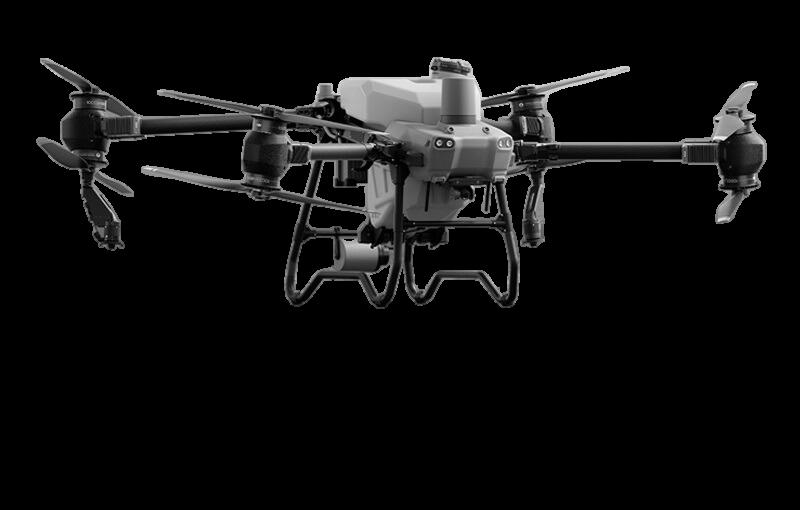


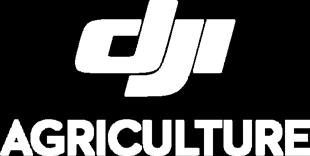



briefs
AgDay is a chance to shine the light on the industry
New leadership new opportunities
Premier’s cane roots could signal new era for industry
Vehicle road safety compliance
Operators are encouraged to check vehicles are compliant
Sharing the sugarcane story
Herbert River directors head back to school
CEO Update
Time to look back before pushing forward
From the Chair
A big issue is the APVMA’s paraquat review
A problem shared
Innisfail growers share learnings on feral pig management
Leading the way
Tully grower has a passion for her community
Water quality knowledge
SRA research that has over time benefited water quality
Regional round-up
Policy updates
Legal updates
Classifieds
Rainfall report
Editor: Robyn Devine
Design & classifieds: Eleanor Fraser
Articles appearing in Australian Canegrower do not necessarily represent the policies or views of CANEGROWERS.
Published monthly by: CANEGROWERS, GPO Box 1032, Brisbane, Queensland 4001 Australia. ABN 94 089 992 969 Telephone: 07 3864 6444
Email: editor@canegrowers.com.au Website: www.canegrowers.com.au
Subscriptions
Yearly subscriptions for 12 hard copies (postage included)
• Within Australia: $190 inc GST Overseas (AUD): $290
12 Month Digital Subscription: $78 inc GST
COVER IMAGE
Jenny Creme inspects ratooning sugarcane.
Photo credit: Renee Cluff
Read more on page 24
CANEGROWERS has once again secured approval for the issuing of exemption permits for over dimension equipment. The exemption was secured for harvesting machinery in all areas across the industry that need to continue crushing into the Christmas Curfew period.
Wet weather, industrial action, and inconsistent milling performance will again see some districts crushing well into the Christmas period, CANEGROWERS CEO Dan Galligan said.
“The ongoing delays are disappointing and costly,” Mr Galligan said. “With the wet season approaching, the risk of severe disruption grows, potentially leaving uncut cane in the paddock.”
After developing analysis and supporting documentation CANEGROWERS met with the National Heavy Vehicle Regulator, the Department of Transport and Main Roads and secured the necessary approval for permits to be issued.
Applications must be submitted before 1 December through the NHVR portal and where approved will allow cane transport vehicles and some agricultural machinery to operate over the holiday period.

Queensland’s sugarcane industry has been rocked by recent tragedies as the industry edges towards the end of this season.
A 61-year-old Halifax man sustained serious injuries and was declared deceased at Ingham Hospital on 22 October after a single vehicle rollover. While on 28 October the Proserpine community was shocked
The Queensland Farmers’ Federation (QFF) is inviting Queenslanders to reflect on the foods and agricultural products they can’t live without this November.
The Queenslanders Can’t Live Without campaign asks Queenslanders to visit the campaign website cantlivewithout.com.au where they can upload a photo and 25 words, or a 10-15 second video, explaining what agricultural product or food item they can’t live without.
The item/s must be an agricultural product i.e. a fruit, a vegetable, a meat product, a dairy product, a cotton product, or a sugarcane product.
Participants will go in the running for a two-night weekend getaway for two people at Barney Creek Vineyard Cottages in the Scenic Rim, along with a food and boutique wine package to enjoy during their stay.
The campaign coincides with National Agriculture Day, a celebration of the country’s farming sector on Friday 15 November.
“It’s amazing to think that so much of what we rely on every day comes from agriculture – from the food on our plates and clothes on our backs to cheaper fuel at the petrol pump,” CANEGROWERS CEO Dan Galligan said.
“And with sugarcane, we’re not just sweetening our morning coffee, we could soon be powering our homes and even our air travel. There really are exciting time ahead for Queensland agriculture.”
Visit
cantlivewithout.com.au to enter or to learn more.
to hear of two fatalities, a 38-year-old and a 59-year-old, who died when their cane trucks collided on a Wilmar owned cane property.
Queensland Police Services are investigating and anyone with information or relevant vision is urged to come forward.

CANEGROWERS congratulates the Liberal National Party (LNP) and Premier David Crisafulli on their State Election victory.
Premier Crisafulli, who grew up in a cane farming family in Ingham, understands the challenges and opportunities facing Queensland’s sugarcane industry, and will have growers’ best interests at heart, CANEGROWERS CEO Dan Galligan said.
“Congratulations to David and the LNP team. We’re excited to work closely with the new Premier to advance the sugarcane sector, an industry I know is close to his heart,” Mr Galligan said.
The Crisafulli family’s long-standing connection to the industry underscores the Premier’s deep knowledge and positions him well to drive growth and innovation.
Mr Galligan emphasised key issues needing urgent attention, including cutting input costs, reducing regulations, and developing a domestic biofuels industry.
“We have had a very close working relationship with Mr Crisafulli and his team while in opposition and we are eager to work with them in government to deliver on their election commitments of a $30M industry innovation fund, a $50M increase in biosecurity funding, and a $12M package to support the Mossman sugarcane industry in particular.”
“Our industry has a bright future, and we need to work on on reducing high water and electricity prices, which limit
productivity and profitability. Addressing these costs is vital for regional economies and the international competitiveness of our industry,” Mr Galligan said.
“Reducing red tape will also foster innovation, enabling the sugarcane sector to thrive. But for this to work we need a tailored, locally driven approach to environmental outcomes, with grower input. This is essential for balancing environmental and growth goals.”
Developing a biofuels industry, with sugarcane as a primary feedstock, is also a top priority, Mr Galligan said.
“Queensland has the potential to be a bioenergy powerhouse. There’s real opportunity to establish a biofuels sector that supports sustainable aviation fuels, biodiesel, and other renewables.
“This new industry will complement our expanding domestic and export sugar supply chains, while also enabling industry diversification that will benefit growers, not to mention creating jobs and prosperity in our regions.
“With Premier Crisafulli’s commitment to advancing Queensland and his background in sugarcane, we’re confident of meaningful progress towards a stronger, more sustainable future for our industry and regional communities,” Mr Galligan said.
CANEGROWERS has spent time working with the National Heavy Vehicle Regulator (NHVR) on the issue of load restraint following the handover of enforcement responsibility from TMR in April of this year.
Overall, the industry has responded well, with most operators complying with load restraint requirements.
Whilst this is positive news, a recent update provided to CANEGROWERS from NHVR on their operations, revealed that more non-load restraint enforcement action has been taken against cane transport vehicle operators than enforcement action from noncompliance with load restraint requirements.
Clearly there are additional vehicle compliance matters that growers and contractors need to comply with.
CANEGROWERS has been advised that numerous structural and brake defect notices have been issued. Infringements notices have also been issued for driving unregistered and uninsured vehicles, breaching mass
limits, fatigue issues and not complying with dimension requirements.
To reduce the risk of this happening, industry operators are encouraged to check their cane haulage vehicles are correctly registered, that they are examined for defects prior to use and that rules around dimensions and mass are followed.
Vehicle defects should be rectified before the vehicle is used. This removes the hassle of receiving a defect notice and having to pay inspection fees. In addition, this improves safety due to removing the risk caused by the defect.
When it comes to vehicle compliance with mass and dimension rules,
information can be found within the National Class 1 Agricultural Notice which can be found on the NHVR website at www.nhvr.gov.au
An agricultural vehicle check list can also be found by searching Maintenance of heavy vehicles used in agricultural or seasonal work on the NHVR’s website.
If you have difficulty accessing the information, please contact your CANEGROWERS district office.
It is important to remember that whilst much attention has been paid to load restraint this season, other road safety and compliance obligations are there for safety reasons and are being enforced.



Artificial intelligence (AI) is everywhere. From opening your smartphone using facial recognition, to detecting banking fraud, AI is now ubiquitous in everyday life.
So why not use it in sugarcane plant breeding?
In late September, CANEGROWERS hosted Coca Cola Europacific Partners (CCEP) and a start-up company from the US called Avalo who advance crop evolution through AI by identifying key genes of interest.
Avalo has developed AI technology which can be applied to plant breeding that has the potential to identify breeding traits and develop new varieties in a shorter timeframe.
The average time to bring a new SRA sugarcane variety to growers is 12 years. So, if a company can shorten that time, it is worth understanding how their technology can benefit growers and the industry.
Coca Cola goes well with a lot of things, but Coca Cola and plant breeding is an unlikely paring. Coca Cola has invested seed funding into Avalo through CCEP and have expressed their desire to explore the possibility of using the Avalo AI technology in the Queensland sugarcane industry. CCEP brought this innovative idea to CANEGROWERS because of our long-term relationship through Smartcane BMP and sustainable sourcing of sugar. Avalo uses AI and machine learning to accelerate the adaptation of crops to climate change. Coca Cola is wanting to explore the possibility of using the Avalo AI technology in grains and sugarcane which are key ingredients in their business. Their reasoning is that if they can assist with variety development which can lead to crops that use less water, fertiliser, chemicals and are more productive, then this is a win-win for all businesses.
CCEP and Avalo visited Mackay to gain a better understanding of the plant breeding process. They met with
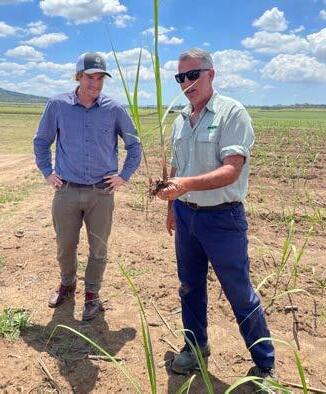
Mackay Area Productivity Services to see how varieties and clean seed is grown, discussed the Avalo technology with SRA plant breeders at the Mackay research facility and toured the district and sugar mill and refinery at Racecourse. The following day, CANEGROWERS hosted CCEP, Avalo and SRA in Brisbane to further discuss the technology and how SRA and Avalo could collaborate.
Avalo is developing an AI technology that can come up with a minimal predictive breeding set for traits of interest which can then be used to design the perfect genotype in simulation that can set a foundation for intensive breeding.
Where this opportunity goes or technology leads is unknown, but one thing is for certain, AI will be influencing plant breeding in years to come.


Directors from CANEGROWERS
Herbert River visited Our Lady of Lourdes last month, a primary school in Ingham, to support Year 6 students in their Design Technology unit on the sugarcane industry.
The unit, Prime Zone: Sugarcane: One Plant, Many Products – Cane, created by CANEGROWERS , offers a comprehensive look at the industry’s processes and products.
The school’s teaching staff invited CANEGROWERS Herbert River to help broaden the students’ understanding, with a particular focus on technology and by-products.

Directors Paul Marbelli, Zenan Reinaudo, and Leah Russo led sessions with two Year 6 classes, sharing their expertise and insights into the industry.
Students eagerly participated, showing great interest in learning about sugarcane production. The curriculum, enriched by the directors’ hands-on knowledge, served as a valuable resource for teachers to integrate into their lessons. Students explored the journey of sugarcane, from paddock to export, and discovered why Australia exports raw sugar.
The visit included hands-on experiences where students interacted with cane sticks, observed how a refractometer measures sugar levels, and learned about various refined sugar types.
CANEGROWERS Herbert River took cane growing into the classroom to provide insights into the industry


They also explored by-products like sustainable aviation fuel, biodiesel, plastics, hand sanitizer, sugarcane mulch, bagasse, and molasses.
Additionally, they learned about advanced technologies used in the industry, such as GPS systems, drones, smartphones, and blockchain technology.

In Ingham, many students have connections to the sugarcane industry, but their knowledge varies. This initiative helps ensure that students gain a deeper understanding of the industry’s impact both locally and globally, enriching their learning and appreciation for the essential role it plays in their community.
World leading reverse fill haulout auto steering controls tractor position in forward direction and trailer position in reverse direction.
3 Improved harvest efficiency
3 Reduced operator fatigue
3 No trailer axle modification
3 RTK base or NTRIP
3 Steer ready or retro-fit
The visit to Our Lady of Lourdes provided hands on experiences and the opportunity for students to ask questions of growers from their local community

“I’ve been waiting since GPS came into the sugar industry for reverse fill haulout tractor autosteer; Arrow has delivered.”
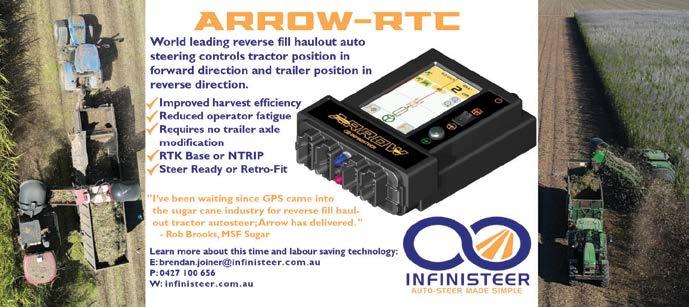

BY DAN GALLIGAN, CEO, CANEGROWERS
The State election and associated change of government has provided a real opportunity for Queensland agriculture.
No matter what happens at elections the opportunity for policy renewal and new thinking exists. This change is particularly profound with a new party, a new leader and government formed off the back of strong regional power base. We already have a good relationship with David Crissafulli, but it will be a new dynamic now that he is Premier.
It is impossible to ignore the opportunity of having a cane grower’s son as the Premier of this state.
This month is also time for us to look back over the last 12 months of effort at CANEGROWERS . Our annual general meeting is an important time for accountability and
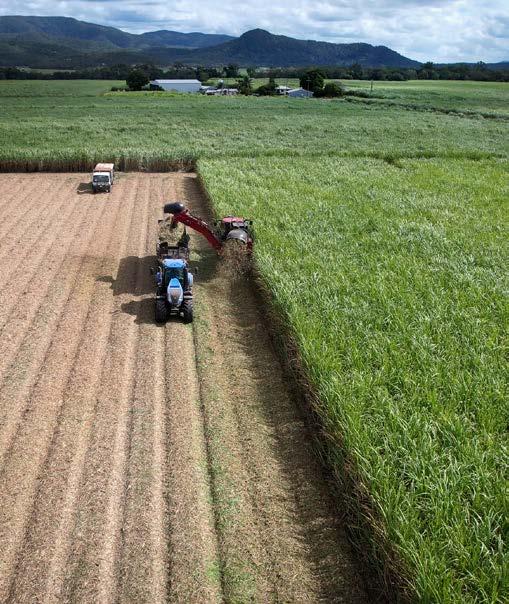
transparency. We want growers to be proud of our efforts and inspired to work with us because that in turn drives us to do more next year.
We have strategic themes that we use to guide us on service delivery, and it is at this time of the year we reflect on what has been done to deliver on these objectives.
We are grateful for the support of our state peak body, Queensland Farmers’ Federation (QFF), our national body, the National Farmers’ Federation (NFF), and internationally through the World Association of Beet and Cane Growers. They bring efficiency to our advocacy efforts and provide a valuable space for growers to meet with colleagues from across a range of other industries and countries. They also provide political leverage. This was particularly well demonstrated this year, when the industry successfully defeated the national biosecurity levy and brought focus to the failing fire ant eradication program.
Additionally, our collective work saw the Federal Government reject what would have been a bad free trade agreement with the EU.
Working with QFF has assisted us to meet regularly with State Ministers along with both the Premier and the Leader of the Opposition.
We continue to focus services on issues that affect growers to improve profitability. Our increased focus and delivery of monthly Marketing Information Services and our Business Essentials and Cost of Production training have received very positive feedback.
Equally, our districts have been working closely with QCGO to inform, advocate for, and implement programs around pigs, rats, and weed control.
Our 13 districts are the front door to our organisation. We are a large industry whose diversity can often be overlooked, but our district model allows local growers’ priorities to receive the same attention as state and national issues.
The practical support that our offices provide is enormous, from leasing support, mill liaison, and cane analysis to local payroll services. We also offer free legal services, free crop insurance and district industrial relations advice along with the brokerage free CANEGROWERS insurance business.
There is no industry without growers, but CANEGROWERS is focused on the benefits of collaboration across the supply chain with those willing to work with us to deliver on our purpose.
We maintain partnerships with Sugar Research Australia, the Australian Sugar Alliance and regularly engage for specific purposes with the Australian Sugar Milling Council, Queensland Sugar Limited, Sugar Terminals Limited, and many individual milling companies.
We recognise new opportunities in the bioenergy sector and have joined BioEnergy Australia, the national peak body for biofuels manufacturers and feedstock providers.
Industry evolution
We view the future of the industry in a positive light, though we are not naive to the challenges and the inconsistent way opportunities may be shared.
As the industry evolves, our grower-led Policy Council and district leaders ensure we view the industry through the lens of what it means for growers, their families, and their communities. In 2023–24, we made record investments in education resources and in the very new and successful Next Ratoon mentoring program. We are very proud of this program and the growers who participated.
Equally important is the excellent work of our districts in bringing together grower groups and women’s sugar groups across the state. Finally, our first-ever Sugar Cubed conference, held in Mackay this year was a great success
There is much more to do and to achieve and while the focus of what we do may often lean towards political advocacy, our impact and timeframes for action goes way beyond political cycles.
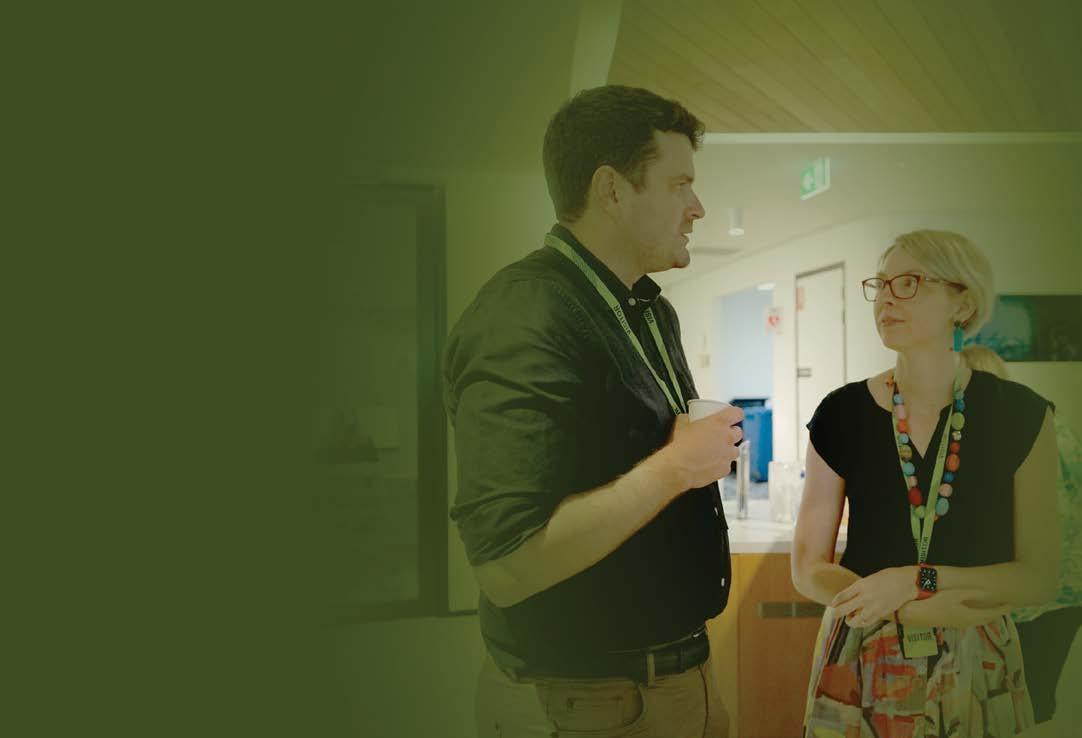
Beginning in early 2025, the NEXT RATOON mentoring program has been designed to help our next group of leaders build strong connections, leadership skills, and knowledge to contribute to a profitable and innovative sugarcane industry.

How long have you been involved in the sugarcane industry and in what capacity?
My family has been involved since the pioneering of our sugar industry in the very early 1900’s on Maroochy River. I am a fourth generation farmer, starting out doing my apprenticeship as a fitter and turner at the Moreton sugar mill in 1986.
Then working full time on the farm for many years with my grandfather, father and brother, until the mill closed in 2003.
In 2011 my father Rodney Apps passed away at which time I took on the management of the farm until I bought my share off the family in 2016. I continue to farm to this day, and am a strong advocate for local farmers and the industry.
What are you most proud of regarding your contribution to the industry?
In the late 90’s my father and I invented the first round bale accumulator system in the world of which I am extremely proud.
Australian Canegrower speaks to the nominees for the position of Grower Director on the Sugar Terminals Limited (STL) Board.
The AGM is being held at the offices of Clayton Utz, Level 28, 71 Eagle Street, Brisbane on Wednesday, 20 November 2024 at 2:00pm (Queensland time). The registration desk will be open from 1:30pm.
Elected by G-class shareholders, CANEGROWERS members are encouraged to make their own informed decisions and lodge their vote. This can be done in person at the company’s Annual General Meeting at the offices of Clayton Utz in Brisbane, by mail or by proxy.
We still use the accumulator today to bale cane mulch.
After the closure of the Moreton mill myself and another farmer organised cane from the Sunshine Coast to be transported and crushed at Rocky Point and Maryborough mills.
We worked together with the CSIRO in Canberra to complete a sustainability report on the viability of the industry in our region. We met with politicians and were able to secure funding towards the building of the Cow Candy plant – which was seen as a viable option for our region to be able to continue.
During this time, I worked together with a small group of local growers to design and have fitted a Class 850 forage chopper box to a Cameco Harvester. This harvester was used to supply finely chopped sugar cane to the Cow Candy processing plant in Nambour of which I was a sitting board member.
Why are you running for the G-Class director position?
Growing up on a farm and having other business interests over the years I understand the importance of diverse income streams.
As an avid investor, STL was an obvious choice to invest into, as a
grower and for long term stability for the industry. When a friend approached me and asked if I would be interested in throwing my hat in the ring to run as a grower representative I thought why not.
My deep understanding of the sugar industry, and the grass root challenges farmers face on a day-to-day basis makes me an excellent advocate for the growers. My experience in business, owning and running several diverse successful businesses, I feel these skills are valuable as a sitting G-Class board member on the STL Board.
What are the major challenges you see for the sugar terminals?
As a grower and living in an area where our mill has closed, I fully understand the impact this has on our cane growing region and the impact on small business and families in the community.
STL is ‘our’ vehicle to store sugar and these terminals are our lifeline. Without good management and good stewardship we would not have an industry.
It’s of great importance that STL terminals are well maintained and kept profitable for the longevity and viability of the industry.

How long have you been involved in the sugarcane industry and in what capacity?
I have been a cane grower all of my life, farming in a partnership with my brother and growing around 10,000 tonnes in the Farleigh district, just north of Mackay. I was privileged at 23 years of age in 1983 to have been elected to the Farleigh Mill Suppliers Committee.
From that first role I have spent over 40 years working to represent cane farmers and the great Australian sugar industry in a number of roles, including as Chairman of Queensland and Australian CANEGROWERS , Vice President of the World Association of Beet and Cane Growers, and as a director of Queensland Sugar Limited.
My commercial board experience also includes time as a Ravensdown Fertiliser Australia Director (2013-2016), CANEGROWERS Superannuation Pty Ltd Director (2004-2012) and as a director of Queensland Sugar Limited (2003-2008).
I also had the privilege of being elected Chairman of the Australian Sugar Alliance, the peak industry body of the Australian sugar industry.
What are you most proud of regarding your contribution to the industry?
Without hesitation, I am proudest of my contribution to fighting for grower choice in the marketing dispute that engulfed the industry in the last decade.
This was a defining moment for growers which gave them fair bargaining powers in cane supply and marketing matters. I am proud of the fact that the grower sector united to become an irresistible force which won the day.
I am also proud of what we achieved on the international trade front. I was Chairman of the industry’s Trade Committee for 10 years, where we secured competitive access into Indonesia, South Korea, Japan, Peru and the UK.
Why are you running for the G-Class director position?
The terminals were built and paid for all those decades ago by growers and millers and are the jewel in the crown of the Queensland sugar industry. They must be protected and optimised – not only to deliver
returns to STL shareholders, but first and foremost to serve the needs of the Queensland sugar industry. We are living in an inflationary environment where costs are increasing.
We need to control and mitigate costs as these are paid for ultimately by growers and millers. I want to play a role in bringing people together, creating trust, and ensuring that STL operates a profitable business that provides equitable access to the terminals while also meeting the expectations of the industry.
What are the major challenges you see for the sugar terminals?
The greatest challenge facing STL is that we must ensure that these world-class terminals remain to service the needs of the industry that they were built to serve.
That might seem more than obvious, but the reality is that the STL structure is accountable to its shareholders. It is imperative that growers are strongly represented at the STL Board to ensure the interests of shareholders are balanced by the expectations of the industry.
This will require leadership and stewardship from the Board of STL of which, hopefully with grower support, I can play a role in.

BY OWEN MENKENS, Chairman, CANEGROWERS

The State election is over and at the time of writing the results are in and the Liberal National Party (LNP) has the majority, just.
The swing against the Labor Party is strongest in regional areas and it shows a stark reminder of the divide between Brisbane and the rest of Queensland.
Queensland now has a sugarcane farm owner and CANEGROWERS member as Premier, a significant outcome for our organisation.
We should not get too far ahead of ourselves though as the closeness of the race probably indicates that the LNP will be very cautious in their policy agenda. I look forward to working with David and his team in the future.
The reduction in the Greens vote in the inner city probably tells us another thing, that extreme environmental policies only work when things are going well. In other words, the cost-of-living pressures will always be first and foremost in a voter’s mind when they go to vote.
Something we will do to remember when creating policy to take to any government. This was topical at the National Farmers’ Federation (NFF) members council meetings in Canberra in October.
As an agricultural sector we need to concentrate on the back pocket of city voters if we are going to influence the agenda.
The NFF has a massive policy agenda dealing with many issues for agriculture in Australia. One of the biggest issues for our industry is the APVMA’s chemical review on the use of paraquat. From our industry perspective Sugar Research Australia (SRA) has received a good response from the survey on paraquat use and CANEGROWERS along with

SRA provided a submission to APVMA at the end of October. From a national perspective Graingrowers, Cotton Australia and the NFF will also be providing detailed scienced based submissions on why this chemical is important to industry. A team approach to this issue is generally the best way to achieve results from an advocacy perspective. The APVMA will not respond until early 2025.
The CANEGROWERS AGM will be held in Townsville at 4pm on Thursday 7 November at the Mercure Hotel in Townsville. I encourage all growers to see if they can find time to attend. Registration is available by calling 07 3864 6444 or email Jodie_Mittelheuser@ CANEGROWERS .com.au
If you haven’t done so, I encourage all growers to visit the CANEGROWERS members portal as the documents for the AGM and other resources are available there for members. Contact info@ CANEGROWERS .com.au if you are having trouble logging in to the members portal.
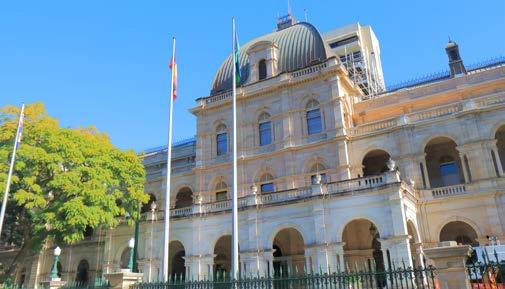

BUSINESS ESSENTIALS HELPS YOU ANSWER THIS QUESTION AND MUCH MORE
The pathway to a resilient farming business future is riddled with risk. This doesn’t mean that your goals shouldn’t be pursued. Improve your chances of success with strategic thinking and find ways to tweak your game plan.
CANEGROWERS has developed a series of compact workshops. Our workshops have something for everyone and growers that have attended in the past say the benefit from attending has been invaluable, assisting them to plan and address blind spots they had and filled any information gaps.
If you have ideas to increase the efficiency of your irrigation system to improve your farms resilience, then express your interest in the workshop now so that we can help you to take advantage of grant and loan options available through QRIDA. These are designed to assist primary producers to implement plans to mitigate drought. This will require that you have a business plan and Business Essentials will also help you to develop your plan for this purpose.
Visit www.canegrowers.com.au or your CANEGROWERS district office today to find out more! Workshops starting from February 2025. Register your interest today for more information
More Locations Added to Your Mobil Card Network!


Queensland Farmers’ Federation members can get exclusive discounts on Mobil Card. Visit www.qff.org.au/our-corporate-partners/mobil/ to find out more.
We’re thrilled to fuel your journey with some exciting news! The Mobil Card network is expanding, and we’ve just added 16 new Mobil Card acceptor locations in Northern Queensland to make your travels even more convenient
With over 800 locations now accepting Mobil Card across the country – including a growing number of truck-friendly sites – you’re never far from the fuel you need to keep your business moving
Finder at mobil.com.au and discover the nearest stops on your route.
If you have any questions about your Mobil Card account or where it’s accepted, our friendly Customer Service team is here to help! Reach us at 1300 173 435 or email us at service@mobilcard com au, or contact your local representative.
The following Trinity sites have now commenced accepting Mobil Card:
Site
Mobil Yorkeys Knob
Mobil Tully
Mobil Tolga
Mobil Spence St
Mobil Sheridan St
Mobil Mourilyan
Mobil Miriwinni
Mobil Mareeba
Mobil Innisfail
Mobil Ingham Road
Mobil Gordonvale
Mobil Edmonton Central
Mobil Edmonton
Mobil Cooktown
Mobil Brinsmead
Mobil Atherton
Mobil Edmonton Central

Street Address
233 Yorkeys Knob Road
59408 Bruce Highway
26 Lawson St
146 Spence St
237 Sheridan St
Lot 26 Bruce Highway
2 Bruce Highway
1 Herberton St
149 Edith St
585 Ingham Rd
67 George St
Lot 500 Hambledon Drive
75-77 Bruce Highway
210 Endeavour Valley Rd
Lot 5 Brinsmead Road
8386 Kennedy Hwy
Lot 500 Hambledon Drive

Suburb Yorkeys Knob T ully Tolga Cairns
Cairns North Mourilyan Mirriwinni Mareeba Innisfail
Mount St John Gordonvale
Edmonton Central
Edmonton Cooktown Brinsmead
Atherton
Edmonton Central
Sugarcane growers and workers in the industry can now access subsidised training through SmartAg Queensland, with access to subsidised lessons (x 5) and the test at 75% off for MR, HR, and HC licenses.
Those in the industry can also access the MC upgrade 50% subsidised. This offer is for up to three (3) employees per business per year.
SmartAg Queensland is an industryled initiative designed by farmers to support farmers to access relevant training.
Farmers can access subsidised accredited, non-accredited and micro-credential training to support their agricultural enterprise to attract, train, and retain a skilled and diverse workforce.
For more information, contact your local CANEGROWERS district office or contact Jasmin Smith, Project Coordinator jasmin@qff.org.au or 0457 043 726


Samoan taro farmers have visited sugarcane growers in Innisfail to seek solutions to feral pig control.
Go early and go hard. That was the advice from Innisfail sugarcane growers to their Samoan taro growing counterparts during a recent feral pig control study tour.
A delegation led by the Scientific Research Organisation of Samoa (SROS) and including representatives from the Ministry of Agriculture and Fisheries, Samoan district councils, a farmers’ association and a taro exporter cooperative visited the Innisfail district to learn the latest in feral pig management innovation.
Sugarcane growers including Donna Campagnolo, Luke Zammit and CANEGROWERS Innisfail Chair Joe Marano heard that feral pigs have only recently become problematic for the Samoan agricultural industry.
“It was around 2022 that it became a major issue, especially for farmers and especially for taro growers,” explained SROS CEO Dr Pousui Fiame Leo. “Pigs have destroyed around 60 per cent of our taro export so it is

severe in regard to our small economy. It really gave the government a strong message that we have to act and find out how we can control pigs.
“We have some measures already like trapping, but we don’t know what the most effective techniques are. We are here to try to work out the best scenario to manage the pigs.”
Luke Zammit said the story echoed his own experiences with feral pigs, which he proclaimed weren’t a major problem in the Innisfail district until after Tropical Cyclone Larry in 2006.
“The cyclone must have opened up the country so that they could get through –that’s all you could put it down to,” Luke said. “On that invasion curve, for years and years it’s easy to manage, they’re around but they’re not too bad. Then they get to a certain threshold and their breeding rate just pops. It’s exponential growth, and then it’s a whole different system. So, if you are still back lower on that curve, it’s really important to hit them hard before they reach that point.
“You’ve got to take out 75 per cent of the population in three months to have any impact over 12 months. If you go out and kill half the pigs on all these farms tonight, in 12 months there’ll be the same number of pigs you started with.
“They’ve got an endless supply of water, an endless supply of food, they’re walking up the main street of Silkwood.”
The Innisfail growers explained it would take an all of community approach to tackling the issue effectively in a wet
tropical environment, with neighbouring landholders required to join the effort.
“I’m happy to control pigs on my land but there’s a council road where the pigs run up and down and it’s the same on the nearby Defence land and other crown land,” explained Joe Marano.
“And therein lies the problem. The pigs have a safe place and as soon as they feel threatened, they go back to their safe place and they breed and multiply.
“In the past five years, I’d say we’ve killed over 4,000 pigs and we’ve still got a pig problem.”
Samoan taro grower Sala Sagato Tuiafiso said he has been using traps and hunters, but his efforts were also being frustrated by a lack of action past his boundary.
“The pigs go into the forest and I can’t control it,” he conceded. “I have hunters with dogs that go through my land but on the other lands, the owners don’t do
anything, so what I do doesn’t matter. We have some people who let their pigs out because it makes them fat – you know free food – but they then go into the forest, get a girlfriend or a boyfriend, they make their own family.
“I planted cassava just to hold them away from the taro. It works, but once they’ve eaten the cassava, they come straight back.
“One time we just finished planting taro and the next day they (the pigs) were digging it up.”
Sugarcane grower Donna Campagnolo, who worked on the banana industry’s lead research for Panama TR4, was able to inform the delegation about the program’s research which tracked pig movements.
“In the Tully Valley, their range was set at 11 kilometres – that’s for each genetically discreet group of pigs. But that’s the whole Tully Valley
CONTINUED NEXT PAGE ‣

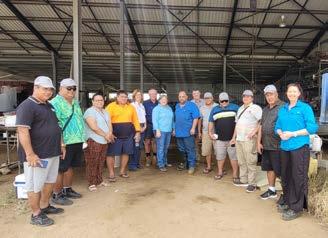


from the top of the gorge all the way through. They’re going to be overlapping everywhere.”
Control measures that were discussed in detail included shooting, baiting, trapping and fencing.
Donna said fencing is expensive and time consuming but can be effective especially when combined with hunters and dogs.
“I go every day to check areas of the fence where the pigs have come under,” she said. “I fix wire and bash the star pickets back down into the ground daily. Pig hunters come every night and if they catch a couple of pigs, they’ll keep coming but the pigs know the areas to stay out of.
“The advantage of the fence is that when the pig hunters come with dogs, the pigs have to find a gap in the fence before the dogs get to them. The dogs bail them up at the fence.”
The Samoan delegation also learned that luring pigs into traps or to eat baits was also a challenge in a wet tropical environment.
“The pig feed is only as good as what you’re willing to put into it,” explained Luke. “I give them grain, I give them pink jelly, I give them vanilla essence, molasses, bananas – I don’t feed my children this good!
“What you put in the trap must be more appealing to them than what they’re currently eating. For us, it’s got to be like candy because the sugarcane is already what they love and it’s hard to draw them out of it.
“It’s also hard to get them to eat out of a hopper when they’ve got free food. If you’ve got a big food source, don’t be fooled into buying an expensive hopper. I made that mistake, and I never killed one pig. I’d hate to see you make that mistake with your money.
In barren country, without another food source, it would work great –but not here.
CANEGROWERS Innisfail has secured funding from the Commonwealth Government and MSF Sugar, through the National Feral Pig Management Coordinator Program managed by Australian Pork Limited, to improve the effectiveness of best practice feral pig management and monitoring techniques for the Wet Tropics sugar industry.
The Samoan delegation’s visit was facilitated by the National Feral Pig Management Coordinator Program, and funded by the Australian and New Zealand Government’s Market Development Facility.
The group also travelled to Cooktown to learn about the feral pig control measures undertaken by Junjuwarra Traditional Owners on Cape York.
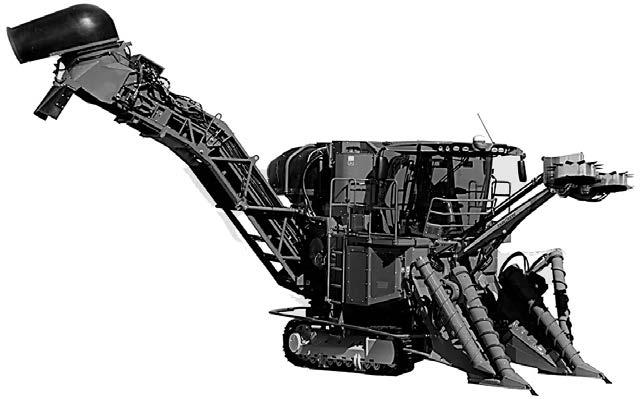


After several successive years of heavily reduced crops due to canegrub damage, thirdgeneration canegrower Dale Holcombe of the Proserpine region in North Queensland, considered turning his back on his crop in the highpressure area.
That was until an ag rep suggested he try Sumitomo Chemical Australia’s Shield Systemic Insecticide.
At his wit’s end, Mr Holcombe, who grows cane with his father Barry near the Andromache River in the Gunyarra district, took part in a 20-hectare trial of Shield at one of his sites in 2023. The result was a 100 per cent decrease in grub count.
Canegrubs are considered the most significant economic pest in Australian sugarcane. They attack and eat the roots, significantly impacting the crop’s ability to take up nutrients and water, therefore, reducing yield and profit.
Historically, growers have used two main products to treat canegrubs, one of which has been phased out.
“We had been using the second product successfully for about 25 years until three or four years ago, when we noticed a

reduced efficacy and the crop started getting decimated,” Mr Holcombe said.
“Because the grubs were under the soil eating the roots off during growth, it was too late to see the damage until the plants fell over during rain or moisture build-up. A big, heavy crop would just fall over and die. We were keen to try something new – we had nothing to lose.”
Canegrub beetles lay eggs in the soil during summer with the larvae hatching into grubs which eat roots off around late summer-early autumn.
“Shield wasn’t getting recommended to growers because it was considered expensive. But we were out of options and prepared to be a guinea pig. During the trial, so many growers with the same problem were ringing me. It has become widespread,” he said.
Mr Holcombe said due to the trial results, he would use Shield in his 2024-2025 program.
Sumitomo Chemical Australia business development manager Jock Leys said a re-examination of Shield’s efficacy in sugarcane found it performed significantly better than the traditional product which came from same class of chemistry. Another six growers who took part in the trial comparing Shield (clothianidin) to the traditional product (imidacloprid) achieved similar results.
“This class of chemistry is under review by our regulator and regulators around the world and could be withdrawn at some point. However, Sumitomo is investing resources and funds to address questions from the regulator to ensure Australian growers will continue to have access. We test major waterways for residues, among other important studies to show Shield is safe,” Mr Leys said.
“We have also reduced the price by about 40 per cent to make it more viable for CANEGROWERS ,” he said.
Established in 1998, Sumitomo Chemical Australia provides innovative solutions including a range of conventional and biological products for Australian agriculture, with a strong focus on cotton and horticultural production. It is a wholly owned subsidiary of Sumitomo Chemical Co, Japan which traces its origins back to the 1600s, and USA-based Valent Biosciences which produces a range of biologically derived, environmentally compatible pesticides and plant growth regulators. Based in Sydney, Sumitomo Chemical Australia has a team of sales and technical support personnel in key agricultural regions of Australia.

Brazil
Your Trusted Partner
Current as of 22 October 2024.
By Elliott Apel, QSL Assistant Manager Trading & Risk
Outlook
India
Thailand
According to UNICA, as of 1 October 2024 505 million tonnes of cane had been harvested and 33 million tonnes of sugar had been produced this season in Centre South Brazil. Poor cane quality has been cited as the reason the sugar mix continues to decline, averaging 48.85% year-to-date. Increased market attention is being paid to the 2025/26 Brazilian harvest season as hot and dry conditions have continued to be detrimental to cane growth. Rainfall in the coming months will be vital in reducing further deterioration to next season’s crop.
As the monsoon retreats from India, the industry looks to commence its harvest season in mid-November. The Indian government’s E20 ethanol target is expected to drive between 3 to 5 million tonnes of diversion from sugar crystal production in the coming year which could possibly influence the capacity of sugar exports.
Thailand received widespread heavy rainfall during late September and early October, creating optimal conditions for sugarcane growth. Thailand’s Office of the Cane and Sugar Board (OCSB) has revised its production estimates for the coming season upward by 18%. Increased planting supported by strong market prices and optimal growing conditions has seen the forecast jump to 10.35 million tonnes of sugar.
Speculators After closing out their positions in September, speculators held a relatively stable net long position in October. As of 18 October, a position of 56,445 lots net long was recorded.
Neutral
The Australian Dollar (AUD) came under heavy downward pressure during October, driven by falling iron ore prices, a vulnerable Chinese economic outlook, and ongoing tensions in the Middle East. In the US, a decline in the unemployment rate has reduced the urgency for the US Federal Reserve to deliver large interest rate cuts. Domestically, indicators suggest that the RBA is likely to maintain interest rates in the near term, with many not expecting the first cut until February 2025. As a result, the AUD declined from early-October highs of above 69 US cents to sub 67 US cents at time of writing.
The outlook ratings above are in relation to AUD/tonne sugar prices. A bullish outlook is considered positive. A bearish outlook is considered negative.
The highest grower-managed pricing levels achieved across all growing regions using QSL products to date (all gross price actual/tonne) are:
• 2024 Target Price = $840 / IFC $870 (Jul24)
• 2025 Target Price = $735 / IFC $735 (Oct25)
• 2026 Target Price = $685 / IFC $690 (Jul26)
• 2027 Target Price = $650
• 2028 Target Price = $550
Key Dates 2024:
• 30 November: Last day for growers to nominate to QSL’s 2024-Season Accelerated Advances Program.
• 30 November: Last day for growers to nominate to QSL’s 2025-Season Pre-Crush Advance Payment Scheme.






Shield is a highly systemic and effective insecticide registered for the control of Greyback and Childers canegrub in sugarcane
• Highly effective soil applied control
• Rapidly stops canegrubs from feeding
• Improved control versus imidacloprid
• Acts through both ingestion and direct contact
• New more affordable pricing


BY RENEE CLUFF
A Tully sugarcane and banana grower is armed and ready to serve her farming community after completing an intensive mentoring and networking program.
Jenny Crema views herself as an accidental leader. But from an outsider’s perspective, the leadership qualities she possesses are no accident, born from the passion she has for the community in which she lives and works.
“My biggest motivation is that I love where I live and I want to use my skills to invest in community and build a better community,” she told Australian Canegrower. “I’m invested in lots of things around youth because I want our community to be strong into the future. Being able to live in a rural setting and still be able to access the opportunities that kids in bigger centres get I think is really important.”
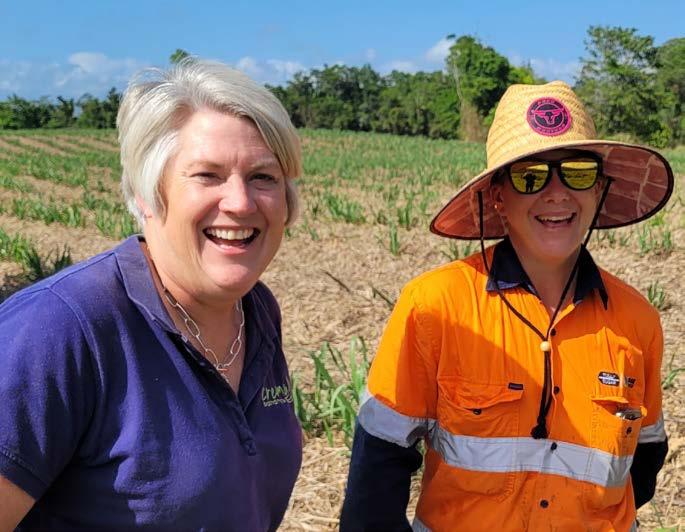
Jenny already serves many leadership roles within her community. She’s been a school teacher for decades, is heavily involved in local sport, manages community events, and of course is a key contributor to many agricultural and business organisations, including as a founding member of the Australian Banana Women’s Network. However, like any good leader, Jenny’s not the type to rest on her laurels. Her unquenching thirst for new learning opportunities recently led to her graduating from the National Farmers’ Federation’s (NFF) Diversity in Agriculture Leadership Program. It’s the NFF’s flagship initiative to fix the under representation of women in agriculture’s leadership ranks. CANEGROWERS is one of 33 program partners of the 2024 Program.
“I saw their ad for the program in the Australian Canegrower magazine and I thought I might give it a crack,” Jenny said. “I saw it as a great opportunity to get the leadership education I needed to fulfill my role in the industry and to step up and see past the office walls, to get myself into a better position to participate in the banana and sugar industries.”
Jenny was one of 12 women across Australia selected to participate, joining the group in chilly Canberra for a three-day retreat and workshop sessions covering everything from leadership styles to digital and social media capabilities, to mental health and wellbeing.

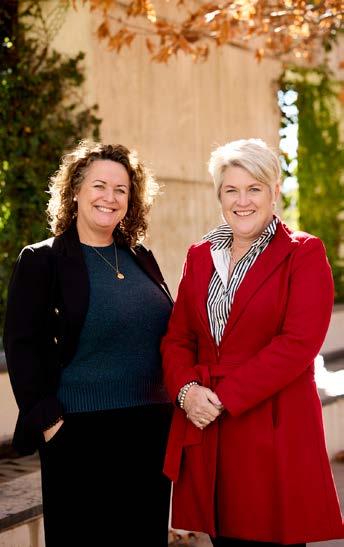

“As farmers, we just get stuck in our own bubble,” Jenny mused. “The other women involved in the program were from such diverse agricultural backgrounds and I was quite in awe of listening to their stories and what they do and the challenges they face and that makes you so much richer as a businessperson and an industry person. The learning that comes from that is empowering.”
For the subsequent four-month intensive mentoring program, Jenny was delighted to be paired with CEO of Plant Health Australia, Sarah Corcoran. “Sarah’s really connected with Sugar Research Australia and with the banana industry and she gets it, she understands our challenges,” Jenny said. “I have found a safe space with her to test my ideas, to bounce them off her. It’s a supportive environment to help me shape my knowledge, my ideals, my opinions. That is the backbone of getting the confidence to be involved in industry and to be seen in a different perspective in that I’m not just the farmer’s wife.
“I want to be a good role model for the girls in the community. I want them to see the value of coming back to their community after they’ve finished their studies and to highlight the opportunities that exist within their own community.”
Apart from being a top role model, Jenny has many other plans for putting her newfound skills, knowledge, confidence and contacts to good use.
“The value of a woman participating in agriculture in this area is all about diversity,” she said. “We’re so diverse in our industries in this area, I think we are better represented as a collective, Women in Ag. I’d really like to use those leadership skills and the outcomes of the program to try to embrace agriculture as a diverse group, particularly across the Cassowary Coast.
“From a leadership perspective, I really need to understand the world of sugar more so I’m hoping to get involved in Women in Sugar but with my own goal of bringing all industries together and
promoting women in agriculture as a collective across the Cassowary Coast.”
The Crema family, headed by industry stalwart Angelo Crema, is now in its fourth generation of growing sugarcane and bananas in the Tully district. Jenny joined the family business when she married Adrian Crema.
The couple has now transitioned to owning and managing their own banana and cane farms, which are dotted across the Tully and Murray valleys. Angelo continues to be a great mentor, contributing a wealth of knowledge and experience which he now shares with his grandson, Rohan, who is starting his journey in farming in the family business.
“Even though we have been part of a cane farming family for a long time, we’re fairly new to the sugar industry in that our focus has traditionally been on bananas,” Jenny explained. “We are close to the properties in the Tully Valley affected by Panama TR4 (Tropical Race Four disease), so that
was our biggest motivation to try to diversify and protect ourselves from the impact of disease incursion.”
Over the same period, Jenny has cut back on her teaching career to focus on farming, taking on responsibility for all the bookkeeping, compliance, human resources and marketing. One of the matters she’s already taken a leadership role in is speaking out against unnecessary red tape, particularly in the area of compliance. She said it’s becoming increasingly difficult to keep up with changes to food safety and quality compliance, labour laws, reef regulations and workplace health and safety rules –among other protocols.
“I feel like I’m drowning in it, it’s just changing so fast, and it takes me away from my core business,” she said. “I feel like I’m having lots of conversations with other growers about this all the time and I’m having to engage external consultants more and more just to make sure I’m complying to all the regulations and keeping all the records we need to keep.
“With passion for what we do and a wealth of experience under our belt, we have learnt to understand, adapt and change to meet the demands of modern-day farming. I worry that the increasing demands of compliance and the ever-present threat of pests, disease and extenuating weather on productivity make it hard for future generations to have the vision, confidence and skill set to give farming a go, and successfully take agriculture into the future.
“That said, farming is in our blood, it’s who we are, and despite the challenges
we will keep finding a correct course and inspire the next generation.”
Jenny’s certainly tackling the issue from all fronts and laughs when asked whether she ever tests the waters or just jumps right in.
“I jump in, that’s what I do, that’s my personality; I’m all or nothing.”



As the lead research, development and adoption agency for the Australian sugarcane industry, Sugar Research Australia (SRA) provides robust and independent research to assist growers to increase their productivity and profitability whilst maintaining on-farm resources and minimising off-site environmental impacts.
SRA has a long history of investing in and researching activities related to soil health, effective nutrient management and targeted agricultural chemical use, benefiting growers’ pockets and water quality.
Projects which began in the early 1990s have built a wealth of knowledge and improved practices for the industry.
In 1993, work began on a 14-year research and extension program, the Sugarcane Yield Decline Joint Venture. SRA (then the Bureau of Sugar Experiment Stations, BSES) was closely involved.
The research identified several practices to address the problem of sugarcane yield decline. The program

promoted the use of controlled traffic farming techniques, reduced tillage, fallow cropping and protecting the soil with cane trash. Amongst many benefits, these practices reduce soil compaction and erosion and increase organic matter.
The water-holding capacity of the soil potentially increased, reducing the damage from rainfall runoff. By retaining a trash blanket, weeds were reduced and so was the amount of herbicide needed. These practices can reduce the runoff of applied nutrients and herbicides, lessening risks to surrounding waterways.
The SIX EASY STEPS® nutrient management program was born 20 years ago. Developed to improve productivity and profitability whilst minimising the risk of losses of nutrients to the environment, it also taught the industry how to maintain soil resources on-farm through sound nutrient and soil management.
The program has been rolled out across the industry through face-toface workshops with growers. In the Wet Tropics alone, 78 workshops were delivered between 2005 to 2013. These workshops are ongoing and now supported by the Online Sugarcane Nutrient Management program.
Using SIX EASY STEPS, soil-specific nutrient management guidelines were developed for soil-specific nutrient management guidelines for South Johnstone, Herbert, Proserpine, Mackay, Plane Creek, Bundaberg, Isis, Rocky Point and New South Wales. These booklets are available as a resource via the SRA website.
In Meringa near Cairns, SRA led two projects working with Wet Tropics growers to investigate an on-farm demonstration of efficient practices managing weeds and pests that could improve water quality.
A similar program began in Proserpine – Pathways to water quality improvements in the Myrtle Creek sub catchment
Demonstration trials were set up to show local growers how specific farming practices, in particular surface applications of both dunder and mill mud, influence water quality. The results and lessons learnt were shared with growers across the region.
Band spray treatments were shown to use about half as much herbicide as blanket spray treatments and could be just as effective at controlling weeds.
To accurately target potential problems, some growers involved began to sample and analyse water leaving their own farms.
A year on, and the Cane to Creek 2.0 project expanded on the two successful Wet Tropics water quality projects. This ultimately extended their reach across sugarcane growing regions from Mossman to the Burdekin.
In 2020, the Central Region and the Wet Tropics Soil Health Project got underway to validate and finetune an SRA soil-health toolkit for growers. It collaborated with soil health research projects in the Herbert and Burdekin regions.
Focus intensified on soil biology and how healthy soils help minimise pests and diseases and maintain good soil structure which in turn increases water infiltration and nutrient cycling.
The same year the Burdekin Irrigation Project began, focusing on increasing industry productivity and profitability through transformational, whole of systems sugarcane approaches that deliver water quality benefits through smarter irrigation practices.
From 2020–2024 the MackayWhitsunday Cane to Creek project used paddock demonstration/trial sites to examine farming practices and impacts on water quality in the Pioneer and Plane Creek Basins.
Dr Matt Schembri recently presented the project results at the Australian Society of Sugarcane Technologists (ASSCT) conference in Townsville. A summary of his paper can be read in SRA’s Cane Matters magazine, Spring 2024 edition.
The Lower Burdekin Smart Irrigation Project commenced supporting Lower Burdekin irrigators to transition to more efficient irrigation systems and nutrient practices. The aim was to reduce on-farm irrigation expenses, run-off and deep drainage losses, and to improve productivity and profitability while boosting water quality to meet targets.
For a full list of current projects designed to further knowledge and improve water quality on-farm practices, visit SRA’s website at sugarresearch.com.au
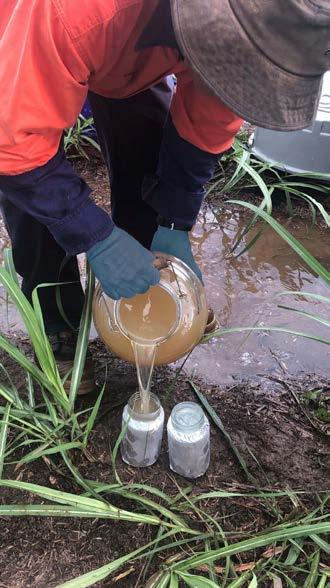
To learn more about SRA’s current and upcoming water quality projects please check out the latest Cane Matters magazine on the SRA website.
SRA thanks and acknowledges support from sugarcane industry stakeholders, universities, corporate sponsors, Government agencies – the Queensland Department of Agriculture and Fisheries and Australian Department of Agriculture Fisheries and Forestry – for their collaboration and funding assistance to improve the productivity and profitability of the sugar industry and water quality in sugarcane production areas in Reef catchments.
Smartcane BMP plays a crucial role in promoting sustainable farming practices, enhancing productivity, and ensuring environmental compliance of the Queensland sugar industry.
The program’s credibility hinges on the impartiality and rigor of independent third-party grower audits which are essential for maintaining the integrity and trustworthiness of the process. The Smartcane BMP program is the gold standard of the sugar industry certification programs, as every grower accredited is audited, not a representative sample, strengthening the credibility of the certification with key industry stakeholders.
Robust audit methods are essential as they ensure the practices being implemented on the ground align with the standards set by the Smartcane BMP program. An audit is more than just a check-box exercise; it is an in-depth evaluation of whether the farming practices meet industry standards, or above industry standards, in key areas of soil health, water quality, and chemical use.
Before an independent third-party audit, a Smartcane BMP facilitator conducts a pre-audit. A pre-audit confirms a grower can provide evidence to demonstrate compliance with best management practices, ensuring they are fully prepared for the independent
audit. This proactive step saves time and reduces stress, as growers are well-organised and are less likely to face unexpected issues during the independent audit.
The Smartcane BMP audits incorporate field inspections and documentation reviews of a sample of records. Independent third-party auditors complete a farm inspection to observe practices first-hand and verify records demonstrating compliance with the program’s industry standards, or above industry standards. The evidence sighted during an audit referenced in an audit report, in sufficient detail, which would allow a third party to repeat the process and arrive at the same finding. Based on the evidence sighted, the auditor will note if practices are compliant, or not compliant, for industry standards, or above industry standards or if there is insufficient evidence to support compliance.
Often there is a misconception that Smartcane BMP audits are watered down or a box-ticking exercise. However, we have had instances where an auditor, when reviewing a sample
of records, has found an oversight on a block record where a grower has unintentionally under-applied nutrition to that block as the totals don’t match their N & P budget. These instances assist growers to refine their practices and adopt more efficient techniques, driving innovation in the industry.
Sampling a few farms for audit, while practical in some scenarios, leaves room for uncertainty. The independent third-party audits instil confidence in stakeholders, including customers, regulators, and the broader community of the program’s credibility. For the Australian sugarcane industry, Smartcane BMP robust audits provide assurance that accredited growers are not only meeting industry standards but are committed to sustainable and responsible farming.
CANEGROWERS delivers the Smartcane BMP project (20222026) with funding from the Queensland Government’s Reef Water Quality Program and CANEGROWERS

Let’s show off the great work you’re doing.
The destination’s the same, but the journey’s different for everyone.
Contact your Smartcane BMP district facilitator to discover what accreditation could look like for you.
September ended with excellent crop conditions and the monthly rainfall come in just under the monthly average at 64.2mm.
October continued with these conditions allowing Mossman harvesters and growers to maximise access to cane. At the end of 18 weeks for Mulgrave Mill, being week ending 20 October 2024, a total of 143,954 tonnes of Mossman Coastal cane had been processed for a district average of 12.07CCS. It was concerning that the weekly district average CCS had been well below 12 for at least 5 weeks which had dropped the district average CCs by 0.25
units. However, in Week 18 the weekly CCS rallied to 12.26CCS which has held the district average at 12.07 for now. With about 5 weeks left of the crushing at the time of writing this, there is still the possibility that Mossman will face a sub 12 district average CCS for the fourth year in a row. The tonnes supplied from the Julatten growers to Tableland mill to the week ending 20 October 2024 was 16,557 tonnes of cane.
The development of the Mossman Transition Plan will reach its conclusion by the end of November 2024.
The Consultants engaged to develop the Plan will present

their latest drafting to the Stakeholder Advisory Committee on 15 November.
The weekly transport and estimate data groups continue to meet with the goal of getting as much of the Mossman coastal cane crushed as possible and then doing calculations using both 2023 and 2024 data and estimate what has been left standing. On Monday 21 October 2024 board members had a Teams meeting with the Liquidator for the DBP Companies, including the Mossman Mill assets. He confirmed a number of
Estimated finish date for the Tableland Mill is 22 November 2024.
This year had started with a cyclone creating a wet season that dumped twice as much rain as normal, (1597mm compared to the mean of 744mm) over a four-month period (December through to March). Some of the growers in the district had recorded over 2 m of rainfall during this period. No one had any idea on how this would affect the 2024 season.
The season estimate started at 900,000 tonnes, with the average for the district being 100 tonnes per ha on historical data. This estimate has been reduced to 770,000 tonnes, with the harvest fronts showing anywhere from 10% to 20% decrease in the cut to estimate. This has reduced
sales has been completed and further Lots were currently in play. He said he aimed to complete the sale process by the end of year, if possible, but it would depend on offers for the big-ticket items such as the spare land and buildings and the factory. Growers will need to decide if they were going to submit Proof of Debt claims by then.
The Company AGM will be held the last week of November, and by then a number of things will be known and depending on those outcomes, things may well change again for the Mossman Coastal growers.
the average tonnes per hectare to around 85 tonnes, the worst since the start of the cane industry on the Tablelands.
On completion of the crush and collation of the data, clarification will be sort as to whether the extraordinary wet season was the only factor or there were other factors contributing to the reduced performance this season.
The manager of CANEGROWERS Tableland had the pleasure of participating in a panel to assess Year 12 students, who applied for a bursary through the Agricultural Futures Awards. It was uplifting to witness the passion that these young people have for agriculture, with a desire to become agronomists being high on their agenda.
The weather has been a little more favourable in the last few weeks and the crop is responding.
Our recently planted SRA approved mother plot and distribution plot that has been established by CANEGROWERS
Cairns Region is progressing nicely. This new initiative by CANEGROWERS Cairns Region has been well accepted. With the end of the season in sight, choices have been made around fallow blocks. Legume orders will be arriving soon with reduced uptake from previous years. Regardless CANEGROWERS Cairns Regions Direct Drill Bean Planter will be in high demand.
For most, planting equipment has been put into storage, although some planting is still being undertaken in the Babinda Region.
Growers in the Innisfail region are enjoying a muchwelcomed reprieve from persistent wet weather.
Previously delayed planting operations are now well underway bringing optimism for the 2025 season. With favourable weather forecasts, it is likely that the season will conclude on or about the 24 November.
The GBRF-funded Cassowary Coast Reef Smart Farming (CCRSF) program draws to a close next month. One of the major final activities involved
There has been a focus on Elections with directors and staff engaging with some local candidates.
National AgDay – Sausage Sizzle in Babinda supported by CANEGROWERS Cairns Region along with other businesses is being held on 15 November in the main street. All money raised will be going to Aussie Helpers to assist farming families and primary producers within Australia.
CANEGROWERS Cairns
Region Deputy Chair, John Ferrando, and Environment and Sustainability Officer, Joel Tierney had the opportunity to meet with the Honourable Tanya Plibersek MP, Minister for the Environment and Water, and Nita Green, Senator for Queensland, and Special Envoy for the Great Barrier Reef.


Driving Behaviour and Practice Change for Feral Pig Management in the South Johnstone District is aiming to identify and implement effective, feasible and practical feral pig management and monitoring techniques that are suitable
a visit by researchers from the University of Southern Queensland. A group of CCRSF sugarcane growers visited the University and surrounding farms and businesses earlier this year. The reciprocal trip – and overall collaboration – is building on discussions around automated crop monitoring, weed control and gap management.
Another visit, this time by a delegation of Samoan agriculture, government and science representatives, came about as a result of another project.
The season has finally produced some more favourable weather in the last few weeks, with showers forecasted for the second week of October, which will be helpful to the 2025 plant crop.
Contract planters have made the most of the good weather to catch up. More than the normal area has been used for plant material as the lower than estimated yield influences resources for planting, with final numbers affecting total yield through the mill rollers.
for the Wet Tropics landscape. Feral pigs have been decimating taro crops in Samoa and the delegation was keen to hear first-hand from our growers about what has and hasn’t worked for them.
Ratoons for 2025 are looking very reasonable for this time of year. There appears to be a greater numbers of sticks per stool with the favourable conditions over the last few weeks. Harvested paddocks have the new growth visible within a couple of days, with the longer daylight hours and warmer days taking effect. This also shows with recently planted paddocks showing the row within 10 to 12 days of planting.
As of 20 October, harvested area is at 65.4% of total area, or 18,157 hectares with 11,347 hectares
remaining. Completed blocks have maintained an average of 76.72 tonne per hectare. Current estimated yield for the season is 74.43 tonnes. Total tonnes as of the 20th of October is 1,491,064 tonnes, which is down 13.9% on the original estimate or equivalent to 224,202 tonnes. Remaining estimate is 725,541 tonnes. At a crush rate of 680 tonnes per hour, the remaining estimated crop should be crushed in a 45-day period, all going well. Taking in to account maintenance stoppages, the season should be completed around the 8th of December.
Fallow crops play an important role in sugarcane and are becoming more popular.
The Tully Fallow Crops Guide for 2024-2025 has just been released for the Tully District to assist growers with selections
that may suit their needs. The guide is very detailed outlining planting styles, benefits of Rotational Cover Crops, Characteristics of Different Legume Species and a Method for Determining Crop Biomass and Nitrogen Content. The guide also has a Checklist for growing Legume Crops, outlining Preparation, Planting and Applying Inoculant and Monitoring Crop Performance. Credits go to Greg Shannon, Cane Productivity and Development Manager for Tully Sugar, Danielle Skocaj SRA, Nancy Rincon SRA and Erin Headon SRA. The Tully Fallow Crops Guide is supported by Tully Sugar COFCO, SRA, CANEGROWERS , Tully Variety Management Group and Tully Cane Productivity Services Limited.
Through this initiative, growers have been provided a mobile number to report late bin deliveries. By texting the expected and actual delivery times, CANEGROWERS Herbert River has been able to establish trends, which are shared with the mill’s transport department. This data-driven approach is aimed at improving transport efficiency and minimising bottlenecks in the supply chain.
In addition to advocating for operational improvements, CANEGROWERS Herbert River is also committed to engaging with the community. Recently, directors from CANEGROWERS Herbert River visited Our Lady
of Lourdes primary school in Ingham, where they supported Year 6 students in their Design Technology unit on the sugarcane industry. The unit, “Prime Zone: Sugarcane: One Plant, Many Products – Cane,” created by CANEGROWERS , offers a comprehensive look into the processes and products of the industry.
Directors Paul Marbelli, Zenan Reinaudo, and Leah Russo led interactive sessions with two Year 6 classes, offering insights into modern technology and the various by-products of sugarcane. This handson learning experience helped broaden the students’ understanding of the sugarcane industry and its relevance in their local community.
As the 2024 cane crushing season progresses, the Herbert River mills have reached Week 18, and operations are facing a temporary halt due to a recent breakdown, expected to cause a delay of 24 to 36 hours.
So far, the mills have crushed 2.6 million tonnes of cane, which equates to about 65% of the total crop. The season-to-date average CCS stands at 12.56. There has been minimal rainfall in the past month, but this still had some impact on harvesting. The mills are currently conducting a reestimate process to ensure growers are harvesting within their estimates, helping to adjust
for any groups cutting above or below their projected quotas.
Meanwhile, the planting window for the season closed in midOctober. Unfortunately, some larger growers were unable to plant all areas due to time constraints.
CANEGROWERS Herbert River taking action
CANEGROWERS Herbert River has been working hard to hold the mills accountable for efficient and effective operations, particularly within the Operations and Transport departments. These two sectors are vital to ensuring a reasonable season length and minimising delays. One key initiative that CANEGROWERS Herbert River trialled this season is a late bin log system.
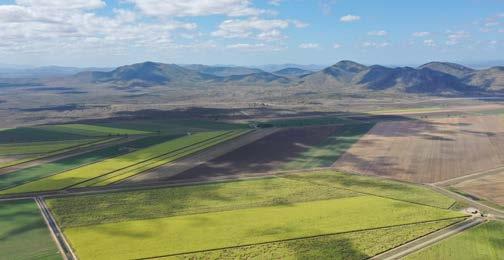
The Burdekin had delivered 66% of its crop at the time of writing which places us approximately 3 weeks behind schedule.
The CCS had started to recover nicely after the August rain event, but the district experienced another lot of rain on 14 October 2024 and this wet weather set the CCS back again which was further impacted by stale cane. The mills subsequently struggled to
cope with mud levels in bins, but when you are 3 weeks behind people are not going to wait until things are perfectly dry to get cane off and most were keen to get going again as soon as possible.
October was the month for a mix of different mill stops with the more notable being a gearbox failure at the Townsville Bulk Sugar Terminal which impacted Pioneer Mill and Invicta Mill. Inkerman Mill also struggled to get going after
a townwide power blackout in Home Hill. Growers are reminded that under the CSA burning must be restricted to 1.5 days from 1 October onwards in order to minimize CCS decline and cane quality. Wilmar has advised that some groups have been burning more than 1.5 days. Whilst this can be explained to a degree with the district being 3 weeks behind schedule and growers wanting to get cane off, it adds to the risk of growers getting caught with burnt cane in the paddock should there be a mill breakdown or rain event. This may then manifest with implications for compensation if there has been an overburn which growers need to be aware of.
CBL met with the new Burdekin
Shire Council Mayor Pierina Dalle Cort and CEO Matthew Magin to run through what our priorities are for the sugarcane industry and we had a productive discussion on rates, siding infrastructure and future expansion into the bioeconomy. CBL had initiated contact with all candidates for the Burdekin Electorate and provided them with CANEGROWERS Growth for Generations 8-point priority list for the 2024 Qld State Election. The CBL Board met with Labor candidate Anne Baker and LNP candidate Dale Last this week and both were receptive towards our industry priorities and working with us locally should they be elected.


Mid-October rainfall interfered with harvesting operations but was still welcomed by growers where soil moisture conditions had deteriorated over the prior weeks.
Although good for plant cane and the crop, this also meant little cane was crushed over this period with additional mill break-downs adding delays to the crush. By 19 October the mill had crushed 1,100,670 tonnes of cane at 14.07 CCS. This was 64% of estimate which lagged the initial crush target by 250,000 tonnes, and where 71% of time had lapsed based on a mid-December finish.
Fortunately, mill crush rates held well over the previous two months with the highest weekly crush since mid-2020 being recorded for week 15 at 97,268 tonnes. Despite a few days lost to wet weather and mill breakdowns over the latter half of October, it is hoped that good crush rates be sustained for the rest of the season. With further rains forecast for mid-November, there remains significant pressure on the mill to ensure no standover for the year.
With stale cane challenges prevalent over the first half of the season, CANEGROWERS Proserpine is currently reviewing the Cane Analysis Program. It is hoped an improved outcome can be achieved for growers through ensuring CCS allocations remain relevant to the underlying conditions and delivery data. Mill start-up CCS allocations have also been a challenge and need to be addressed prior to the 2025 season.

A tripartite MOU will be entered into with the Whitsunday Regional Council (WRC) and Wilmar to improve data sharing and support at committee level for the purposes of monitoring and managing Proserpine District cane areas. Particularly regarding urban expansion for the Cannonvale area and other residential developments. It has been encouraging to have the WRC continue to extend support to the industry through reduced rates on sugarcane land and continued consideration of industry challenges.
AGM preparations are underway for all four entities held under CANEGROWERS Proserpine administration. For CANEGROWERS there will be some key issues being addressed through proposed Co-operative Rule changes. This will include updates to the Cooperative Objectives to align with ATO not-forprofit status requirements, the proposal to provide paid services to contracting groups and alterations to Director nomination forms. All members are highly encouraged to attend the AGM which will be held at the Proserpine RSL on Tuesday 19 November.
The breakdowns – including some extended events – at mills continue, exacerbating an already delayed crushing season in both Mackay and Plane Creek milling areas.
It is frankly deplorable that as we reach November we are hovering around the 60% mark, and for many growers the delays to crop cycles and farm management practices are impacting profitability. Your harvest management representatives are continuing to impress this reality upon millers.
It has been positive to see Mackay Sugar offer interest free loans to growers that have very low percentages of their crop so that they can meet fertilising and planting costs. That said, it would be vastly preferable for all that poor mill performance at Marian had not placed growers in that position.
Crop estimates at Plane Creek have now been raised to 1.51Mt, Mackay has moved down to 5.23Mt from an initial season crop estimate of 5.3Mt.
With it clear that the crush – pending monsoonal onset timing – will extend into the Christmas period in Mackay, and potentially into the New Year in Plane Creek, District Manager Michelle Martin has worked with
Recent Growers to feature in Mackay’s The Billet magazine have had diverse crops
Top: Trevor Jenvey, on Mackay’s Northern Beaches produces pineapples
Bottom: Ray and Cheryl Abela at Eton allow photographers to hire their sunflower paddocks as a portrait setting
QCGO Senior Manager-Industry
Burn Ashburner to secure an agreement that there will again be Christmas Curfew permits available for those requiring, through the National Heavy Vehicle Regulator portal. We thank NHVR, QLD TMR and the QLD Police Service for working with industry to help us remove our crop. Such collaboration is not taken for granted.
Any growers requiring assistance with any issues are encouraged to call 4944 2600 to get the ball rolling on a solution. Keep an eye on our Facebook page, The Billet and weekly District Manager Updates for emerging training and industry opportunities.



Bundaberg Sugar Mills processed 47,305.76 tonnes for the week ending 20 October, this brings the season-to-date to 892,555.84 tonnes.
The average CCS for Bundaberg Sugar Mill for week 22 was 14.71 CCS and the season CCS average for Bundaberg Sugar Mill is at 13.51 CCS.
The highest individual CCS for the week was 17.20 units for Q208 Older Ratoon and the highest variety average CCS for the week with supply greater than 500 tonnes was 15.28 units for variety SRA 29.
Irrigation customers in the Bundaberg Distribution Scheme participated in a three-year electricity cost pass-through trial from 1 July 2020 to 30 June 2023. During the trial, Sunwater’s actual, scheme-level electricity cost savings (if any) were passed through to irrigation customers at the end of the financial year via a credit applied to their bills. Following our requests Sunwater has chosen to extend the electricity cost pass-through trial until 30 June 2025 and in 2023-24, Sunwater spent less on electricity than recovered from customers in the Bundaberg Distribution Scheme. This means eligible irrigation customers who
used water in 2023-24 will have a credit of $15.46/ML applied to their bill in October 2024.
In response to requests for Chemical Safety Training, SmartAg QLD has agreed to subsidise eligible training by 75% with the next course scheduled for 29 November. If you or your employees are interested in undertaking this training, please contact the office on 4151 2555
The Miles Labor Government has given its preliminary view on a Fox Resources mineral development licence application (MDL 3040) in the Bundaberg region. Minister for State Development and Infrastructure Grace Grace has assumed responsibility for assessing the application to address a potential conflict of interest of Resources Minister Scott Stewart. Minister Grace’s preliminary view is that the application is not in the public interest. Fox Resources has been invited to provide further submissions in response by 15 November 2024.
Charles Burke has been appointed to the position of Queensland Food Farmers’
Commissioner to assist producers and to provide a point of contact for matters affecting farmers, provide information and advice to famers to support relationships with supermarkets, work collaboratively with State and Commonwealth
Perfect harvesting conditions have continued across the Isis District.
At the time of writing Isis Mill had crushed just over 871,680 tonnes with a season-to-date average CCS of 13.49.
We have continued to experience mill breakdowns with some 845 hours of lost time recorded for the season to date. Isis Mill are holding their AGM this week and our grower shareholders are very keen to hear what steps the mill will be taking to ensure we have a return to mill reliability. Growers are very disappointed with the number of breakdowns during the peak CCS window and the impact the extended season will have on the relative CCS and next season’s crop potential.
The office has continued to dedicate substantial time to monitoring the implementation of the cane analysis program and the allocation for the unprecedented amount of delayed cane. To date there has been just over 100,000 tonnes of delayed cane for the season which equates to just over 12% of supply.
We have concerns about getting the crop off before Christmas should the current trend of mill breakdowns continue. We are also entering our traditional
entities, monitor and advise the Queensland Government on arrangements that govern supermarkets and their supplies and prepare and publish reports as appropriate on particular issues affecting farmers and consumers.
Progress has been interrupted with effectively four days lost with a significant mill breakdown.
Isis mill restarted early Wednesday 23 October with another wobble the next night.
storm season which could increase our chances of losing more time due to wet weather.
The CANEGROWERS Isis Harvesting Equity Committee will continue to monitor harvesting equity between and within groups as the season unfolds.
We recently met with LNP Members Deb Frecklington and Stephen Burnett to discuss the election promise the Labor Government has made about the threshold for large electricity customers. Labor has agreed to raise the threshold from 100 megawatt hours (MWh) per annum to 160MWh/a should they be re-elected. We called on the LNP to match this promise. We covered additional topics on right to farm, fairness and equity in rating and stamp duty on insurance with them. We also met with Australian Gas Infrastructure Group to discuss the Wide Bay Bioenergy Hub, an initiative aimed at creating Australia’s first completely decarbonised regional gas network.
Planning for the Southern Region Haulout Course early next year is well under way.
Our AGM will be held on Wednesday 27 November and we will welcome the recently elected Mayor Helen Blackburn as our guest speaker.
At time of print we have reached 302,687t supplied from Maryborough and season average of 13.5 for CCS.
Concerns over transport shortfalls with a lack of trucks and drivers seem to have been addressed with additional subcontract trucks now in the system. Hopefully, this should
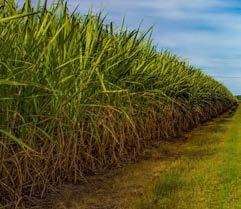
At week 12 (19 October) the Rocky Point Mill has crushed a total of 122,127 tonnes at an average CCS of 14.28.
Our current estimate is 345,000 tonnes and at this point we are targeting only 75% of the crop. The limiting factor will be mill reliability and weather. There are tentative discussions around taking a small break over Christmas and continuing the crush until the first week of January.
CANEGROWERS Rocky Point has engaged a loss adjuster to do some preliminary
allow us to maintain supply levels through to the end of the season in December.
This does mean there will be new drivers trying to find their way to loading pads and a reminder for harvester crews to use and put out signage for where you are operating from.
The better we can work together over these next 10 weeks, the more cane we can successfully supply.
Isis Mill has been working on improvements to the transloader, and successful transfer of cane into the mill.
CANEGROWERS Maryborough board has a further update after the mill AGM to review proposed changes for the future.
QSL presentation on the sugar market was conducted on 24 October with an excellent roll up with 20 people attending.
investigations and advise the likelihood of success of a claim against Gold Coast Council for flood losses in January 2024, which we believe were exacerbated by an unfinished bridge at one of the major drainage outlets causing obstruction.
We have had some instances of arson again this season, along with the usual dumping of rubbish and car burnouts. The cameras we have in use around the district appear to be effective, however, the problems still occur wherever the cameras are not visible.
SUPPLIED BY CANEGROWERS HERBERT RIVER
CANEGROWERS Herbert River has been instrumental in guiding its members toward achieving Reef compliance, ensuring alignment with current legislation and regulations.
When members receive notices about upcoming compliance audits from the Department of Environmental Science, one of the first calls they often make is to CANEGROWERS ’ office. The office is a valuable resource in helping members understand the legal requirements for compliant sugarcane farming to navigate the audit process with confidence.
Since 2019, sugarcane growers have been required to maintain a Nitrogen (N) and Phosphorus (P) Budget as part of their compliance efforts.
To support this, CANEGROWERS Herbert River, in collaboration with local growers, has developed a user-friendly N&P budget tool. This tool enables growers to input soil test data, calculate permissible N&P levels, and manage fertiliser applications efficiently.
It not only helps growers meet compliance requirements but also allows them to optimise their fertiliser usage for consistent and profitable crop yields.
The N&P budget tool provides growers with a streamlined way to input soil test data, access agronomistrecommended fertiliser products, and track applications as mandated by legislation.
This gives growers a clear overview of their budgeted versus actual fertiliser use, empowering them to make informed decisions throughout the growing season.
While the tool does not offer direct nutrition advice, it serves as a crucial system for managing compliance and operational needs.


Feedback from growers has been overwhelmingly positive. One secondgeneration grower, with 36 years of experience in the district, initially found the compliance process daunting but now sees the tool as an essential resource for making better decisions about fertiliser use. Another grower, who has been farming in the area since
1997, emphasised the tool’s ease of use and its superior functionality compared to his own earlier attempts at creating a similar solution.
CANEGROWERS Herbert River is committed to ensuring that members receive the necessary support to use the tool, offering hands-on guidance and detailed instructions.



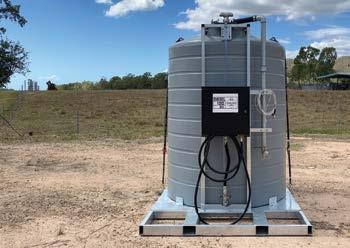
We encourage all members to reach out to the office for support with compliance matters, regardless of whether they have received a notification about an audit or are wanting to understand the requirements.
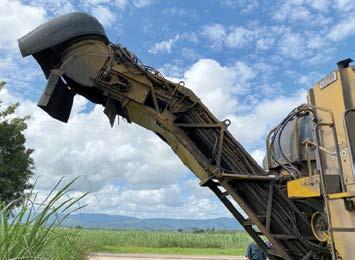
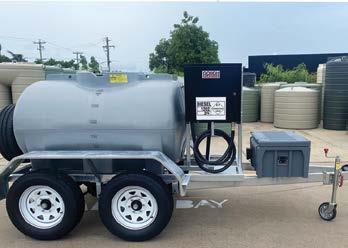

BY ELISA WESTMORE
In July this year, after a nearly 30-year assessment, the Australian Pesticide and Veterinary Medicine Authority (APVMA) released its draft regulatory assessment for paraquat.
Their decision sparked controversy in the media, with stories from the ABC and Landline criticising the APVMA for not immediately banning the chemical, citing concerns about its alleged link to Parkinson’s disease. However, this claim doesn’t quite hold water.
The APVMA, in an unusual step, issued a media release explaining the evidence they had considered, which shows the argument linking paraquat to Parkinson’s disease doesn’t stand up to scientific scrutiny.
Though the APVMA’s clarification was welcome, it didn’t prevent them from later recommending restrictions on paraquat use in the sugarcane industry that effectively ban it anyway. The draft regulatory recommendation

limits its application to a rate no higher than 231g a.i./ha, sprayed once per year, which is below the current label rate. This decision was based on perceived environmental risks to birds and mammals.
However, the evidence supporting this environmental risk is just as tenuous as the Parkinson’s link. The APVMA’s assessment was based on European Food Safety Authority (EFSA) models, which use European data for European wildlife. The studies involved in these assessments forced paraquat into birds on an empty stomach, despite the existence of dietary studies that more accurately reflect real-world conditions.
In response to this, CANEGROWERS and Sugar Research Australia (SRA) took action by surveying cane growers to gather real-life data. The response was overwhelming, with 682 growers sharing their observations. Some provided detailed records from their bird books, noting species that have bred in their fields over the years, demonstrating that paraquat hasn’t harmed the local bird population. This invaluable data will strengthen the submission to challenge the APVMA’s decision, and we are immensely proud of our members for their participation.
The debate over chemical use in farming is far from simple. It’s important to acknowledge that chemicals, when misused, can harm the environment. But, as with most things, the dose makes the poison. Many of the alternatives to paraquat, such as residual herbicides and tillage, can actually be more harmful to the environment.
CANEGROWERS doesn’t support reckless chemical use. In fact, we’ve worked hard to reduce pesticide and herbicide levels in our local waterways through our Best Management Practice (BMP) program. But chemicals are a vital part of farming, and in some cases, like with paraquat, they are the least harmful option for the environment.
At the end of the day, we need level-headed, factbased discussions about chemical use in agriculture. Emotion and misinformation shouldn’t drive these decisions. Rest assured, we won’t give up this fight.

BY BURN ASHBURNER
CANEGROWERS has a clear path for strategic issues to flow from individual growers or branch meetings to the District Boards and then to the Policy Council.
If these issues require more in-depth investigation, they are passed on to one of the Policy Council committees who then makes recommendations back to the Policy Council.
As we often say, it is much easier to find problems than to solve them. Thus it is not an easy task to come up with recommendations or policies to solve issues. It is also not always clear as to whether the solutions should be addressed at a district, industry, state, federal or even international level or a combination of these.
I work with the Farm Input and Research committee which has some critical strategic issues to deal with. We have seen the closure of mills over the last few years. In general, this is due to loss of cane land and cane tonnage, deterioration in mill performance and leading to a downward spiral. Arguably this was caused by generally low levels of profitability for growers and millers when the sugar price was averaging $420 to $450 per tonne.
There are a lot of cause-and-effect issues but the downward spiral puts mill viability at risk. Growers need a reliable mill which harvests the cane in as short a season as possible and millers need a reliable cane supply.
Another issue is the real risk posed by the harvesting sector. This is partly a symptom of mill performance with the same amount of cane harvested over a longer season and partly the rise in harvester costs. This may lead to cane not being harvested or the cost of harvesting increasing significantly and reducing grower profitability, driving some growers out of business.
So far I have been articulating the problems (the easy bit) and clearly we want to avoid this downward spiral. I think even our most vociferous critics would agree with this.

Finding a solution is more difficult and will take a whole of industry approach. The Sugar Plus Roadmap gives a clear direct for this, however as an industry I don’t think we have embraced this. We need to find a way to have meaningful discussions which put aside the grower/miller win/lose culture and work together at an industry and district level. To this end there is a possible two-pronged approach.
One approach can be at an industry level to engage with millers initially through ASMC to put together a more technical group to address the options for an industry model and the requirements for mill area viability. Hopefully this will get us all on the same page. This is very much the Sugar Plus better business as usual approach.
The other approach happening in parallel would be at a district level aiming at a Sugar Plus for Districts or similar activity with the aim of giving the districts options to address their mill area strategic needs for viability and profitability.
Perhaps with the current high sugar price and the opportunity to lock in profits up to 2026 millers and growers may respond positively with higher levels of investment in upgrading mills and producing more cane.

BY MATT KEALLEY
On the road into Gayndar, there is a prominent landmark called the Big Orange and a mascot of a character signifying the importance of citrus in the region. Sugarcane is not grown in Gayndah, however CANEGROWERS travelled to the town last month to present to the Citrus Australia Board about the Next Ratoon mentoring program.
Mentoring with young citrus growers is something that Citrus Australia are interested in pursuing. Greg Fraser, one of the mentors for the 2024 CANEGROWERS Next Ratoon program and the deputy chair of Cirtus Australia, was keen to share his experience with the Citrus Australia Board. Greg also invited Rebekah Pace, his mentee and sugarcane grower from Herbert River, to talk about her mentoring journey and what she got from the program and the mentoring from Greg. Rebekah spoke eloquently and the citrus growers were keen to know more about her experience and family business.
The meeting was followed by a field visit to citrus growers in the Gayndah region and learn more about the production of mandarins and limes which touched on pests, market drivers, weather and labour costs.

Visiting this industry reinforced the challenges and opportunities citrus face in getting product to market and the similarities sugarcane and citrus have with variety development, biosecurity and succession planning.
ASR ProTerra Social Verification Audits in Burdekin and Mackay
Since 2017, CANEGROWERS has been working with the US sugar refiner, American Sugar Refining Group Inc (ASR) on sustainable sourcing and ESG needs. ASR buys Queensland raw sugar through the US quota and needs to show to their customers that the sugar they’re buying is sustainably produced and meets environmental and social indictors, such as no slave labour and low carbon emissions.
ASR demonstrate this through the ProTerra standard which emphasises human rights and good labour practices such as workplace safety, equal opportunities, and particular attention to preventing child and forced labour; good agricultural practices; deforestation and low carbon emissions.
For a few years now, CANEGROWERS has been working to get more value to growers using Smartcane BMP.
CANEGROWERS met with Rafael Vaya VP Corporate Social Responsibility at ASR in Brisbane about the ProTerra ASR sustainability audits. He also met with the QCGO Board which was a good opportunity to discuss sustainability and the ESG needs for ASR.
ASR has completed ProTerra Social Verification Audits with Wilmar Sugar in the Burdekin region on the Invicta, Kalamia and Pioneer mills and with Mackay Sugar for Racecourse, Farleigh and Marion mills between 30 September and 11 October 2024.
These audits included three Smartcane BMP accredited growers from each mill area. CANEGROWERS worked with ASR and the Smartcane BMP facilitators in each district to identify growers to participate in the audits process. From all accounts the grower audits went well, and reports will be made available to the participating growers before the end of the year.
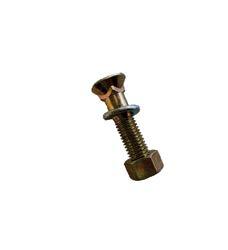





























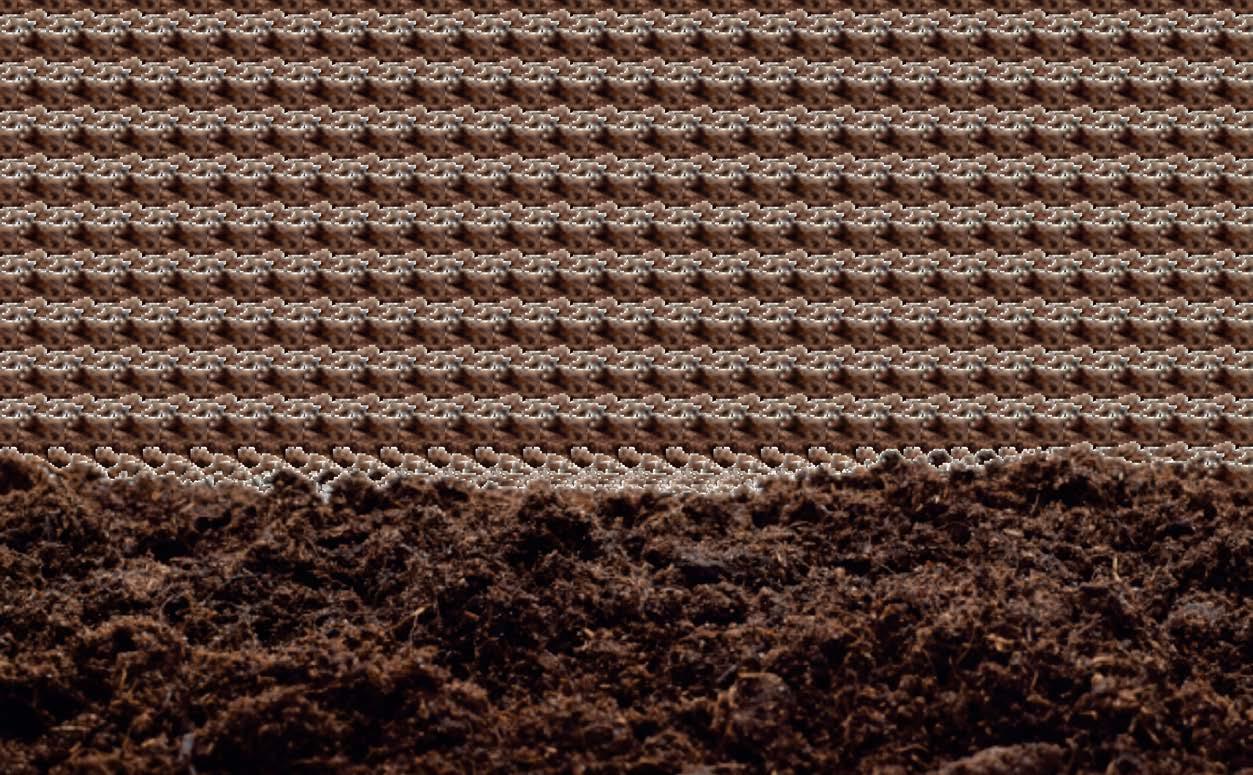

BY CHRIS COOPER
With a wet start to the 2024 season, and a likely late finish to crushing in some areas, probably the last thing growers want to read about are water authorisations.
They remain however of considerable importance to many sugarcane growing areas in Queensland.
Requirement for authorisation
Water is a valuable resource, and governments have progressively increased regulations over access and use of water. Growers may need a formal authorisation before they can take or interfere with water. Under the Water Act, it is an offence to take or interfere with water without an appropriate authorisation.
Exceptions
There are some exceptions to the requirement to obtain an authorisation and these relate to:
Emergencies including firefighting, cyclone and flood
Camping
Watering travelling stock
Traditional activities for Aboriginal and Torres Strait Islander people.
Riparian rights which allow water to be used for stock and domestic purposes if your land adjoins a water course.
Types of authorisations
Water allocation: An allocation usually allows the holder to access and take a certain volume of water from a particular source such as a watercourse or underground aquifer. An allocation is a distinct asset, not attached to land and the ownership of the allocation is entered onto the Water Allocations Register. Allocations can be bought and sold and transferred and even mortgaged. Allocations are generally of 2 types. Supplemented meaning the water is delivered from infrastructure such as a dam or weir and obtained from a Resource Operations Licence Holder such as SunWater. Unsupplemented meaning the water supplied is not reliant
on infrastructure to store or distribute it and is supplied by the relevant government department namely Regional Development, Manufacturing and Water.
Water licences: A water licence is generally issued for more long-term water taking activities including those associated with certain stock and domestic purposes, irrigation, storing, holding or impounding water. A licence permits the use of water on a particular parcel of land and includes supply from a spring, watercourse, overland flow or underground. A water licence cannot be sold separately from the land that it attaches to.
Water Permits: A permit may be issued for temporary water uses generally on the condition of a fixed end date.
It is common that the process or taking water may involve other activities that will require associated authorisations. The installation of pumps and bores may require a development approval. Also, if you are planning to excavate, place fill or destroy native vegetation in any watercourse, lake or spring , you may in certain circumstances require a riverine protection permit. In some cases the construction of levee banks that interfere with water flow may also require local council approvals.
Water and the taking and use of it can be a complex area. It is prudent to err on the safe side and contact the relevant local authority and the department before using or interfering with water.
This article contains general advice only. The particular facts and circumstances of each case always need to be taken into account.
The comments in this article are general in nature. For further free advice and information about this topic or other legal matters, members should contact their local CANEGROWERS office or please contact CANEGROWERS Legal Adviser, Chris Cooper on Free Call 1800 177 159
20 november 2024
As you contemplate your vote at the STL AGM consider:
• STL continues to deliver its Strategic Objectives
• Profit up to $32.5M
• Increased dividend to Shareholders
• $1.8M rebate back to Customers to offset industry cost pressures
• Invested close to $17M in these critical industry assets

• Delivered new Infrastructure at Bundaberg – on budget – to assist business diversification without affecting priority of sugar
• Addressing Inactive Grower issue – getting shares into the hands of grass root Cane Farmers
• Delivering greater transparency and accountability of costs and performance – driving costs lower
Make your Vote Count at the Upcoming AGM – Complete your Proxy Form!
You can simply appoint the Chair as your proxy at Step 1on your Proxy Form and complete your MSD Form Working for you
• Progressing the move to insource terminal operations – to drive efficiency and cost savings
• Transparent Remuneration Report for Directors and Management
• Board stability will ensure STL continues to deliver for the entire Sugar Industry – not sectional interests
FIRST 5 LINES FREE* FOR CANEGROWERS MEMBERS!
Book online 24/7 at www.canegrowers.com au or email us at ads@canegrowers.com.au
Next deadline is 20 December 2024
Toft 6,000L10 Cummins engine, 2,000 hrs, swinging knife, new elevated chain sprockets and wear strips. Floor still good, lots of new hoses, good reliable machine. $22,000 incl GST. Ph: 0408 665 955
2020 Case 8810 fulltrack cane harvester. Purchased 2021, cut 3 seasons. In good condition with plenty of spares. Ready to cut. Tully. Ph: 0407 160 758
2001 Isuzu service truck FRR Series, diesel, 3 seater with welder, hydraulic hose maker, compressor, numerous compartments fully lockable $50k + GST, 12m V-blade $10k + GST, RES dolly trailer $20k + GST, 44 plate (28" plate) and 24 plate (32" plate) Baldan offset disc ploughs, 10L Bunded fuel tank $10k +GST. Ph: 0409 580 586.
Kubota zero turn ZG 222 with catcher 48" cut. Fiat 980 2WD – 3,500hrs, Fiat 1000 2WD –5,000hrs, John Deere 4040 2WD – 3,600hrs, Chamberlain JD 4080 2 WD – 5,000hrs, Case 2590 2WD – 5,700hrs. Massey Ferguson 3635 4WD – 5,500hrs. Silvan Euro Spand CX2 spreader, portable bulk bin, Bunning Lowlander Mk 40-60 ag spreader (near new), complete tracks to suit cane harvester, and fuel trailer tank. Mulgrave area. Ph: 0407 160 673
1997 JD 7810 4x4, 7,896hrs. Quade box., duals 20,8 38, 70%. Intergrated JD auto steer, 2630 JD screen and JD 3000 RTK reciever. JD Q-hitch. In cab 10" monitor and rear camera. Tinted windows. Cab in good condition as per whole tractor. Total rebuild of rear end 2 years ago, receipts available. Original owner. $100K + GST. International 1486 2wd cab tractor with double bin trail with 7,000L tank, honda pump and truck crane mounted, ideal for planting, $30k + GST. 120" howard rotaryhoe with roller and rippers, $15K + GST. HBM heavy duty billet planter, new dip, elev chains, drive shafts and bushes. New drive tyers. Stainless boxes, holds over half ton. Rear wheel steer. Tanks and PTO pump for tractor, $30K+GST. 2.5t Gessner fert box with double disc openers and 300L tank and tool bar attachment to fertise plant. On 3-point hitch. $25k + GST. Case 28 plate 770 offsets, new tyres. with 30" round discs, fronts worn to 28" rear 30" with cover discs. 2 new spare 30" discs $20K + GST. Ph: 0428 682 886
As new John Deere O Turn Z 720E, 350hrs, 54” cut – $8,500 ONO. 1,300L Gal fire fighting trailer – $1,500 ONO. Case 580E front backhoe bucket – $500. 80” rotary hoe set up for min till – $500 ONO. Mulgrave area. Ph: 0407 675 361
* As a FREE service to CANEGROWERS members, Australian Canegrower will print suitable classified advertisements UP TO 5 LINES FREE, FOR ONE ISSUE ONLY. A charge of $5. 50 will apply for each extra line or part thereof. A charge will apply for advertising of non-cane growing activities. Advertisements must relate exclusively to cane farming activities, such as farm machinery, etc. Advertisements from non-members are charged at $11 per line incl GST. Only prepaid ads will be accepted.
New Cane stool splitter discs 30” x 10mm boron Steel. $200 incl PH: 0427 044 443
Case/Stiger 9250 & 1200 Obryan ejector bucket. With cushion hitch. 6,366hrs. Fitted with T3rra Cutta, I-Grade , Panasonic Tough Book 726hrs and JD 3000 SF1 cab receiver, no auto steer. Also have T3rra design software to transfer to your computer. Does not come with bucket receiver or in cab John Deere screen. Have an assortment of spare parts for bucket and tractor. All in working order ready to work. Selling as is where is. Ph: 0428 682 886
Set of half tracks to suit John Deere 3520 cane harvester. Ph: Ferdinand 0421 043 609
Expressions of Interest for shares. Email rigato.office@bigpond.com with offer or any questions.
2012 John Deere 7200R tractor PTO, 3PL with quick hitch, 4 sets of remotes, front weights, front tyres 540/65R34, rear tyres 650/85R38, 4,510hrs. In good condition. $160,000 + GST Ph: 0427 976 416
10ft Galvanized superior slasher in good order Ph: 0457 255 961
Howard Rota Vator HR51 Rota. Ph: 0457 255 961
Terranova rotary hoe 120" bonel 4 disc plough square. Mulgrave area. Ph: 4056 1474
One pair 21L-24 Armour earth moving/quarry tyres, currently on a backhoe. Good condition. $700 each tyre plus GST. Ph: 0419 150 350
2 x 440/65 R24 tractor tyres $1,100 Inc GST each. 2 x 540/65 R34 tractor tyres $2,100 incl GST each. All four types as new only done 500hrs. Ph: 0427 665 759
36 plate case 770 offsets, 30" discs $40,000 and HBM plant cutter with topper $4,400. Ph: 0448 345 139.
Massey 4608 excellent condition 2,000hrs. Ph: 0418 972 705
3 tonne fertiliser stool splitter stainless steel box 1.5–1.8m spacing $25,000 (+GST) Ph: 0429 912 135
Tractor TE20 good condition, $3,300 GST incl Tractor AV International 130 with fertiliser equipment and scarifier $3,300 GST incl tractor AV International 140 with spray equipment $3,500 GST inclusive. Ph: 0428 183 307
2006 Case IH JX109OU in good condition. Always serviced – 6,800hrs $24,200 (incl GST). Tully area. Ph: 0427 665 759
Howard CH 2000 rotary hoe 4.2m wide, hyd 5 tyne ripper hillers new blades. $45,000 plus GST. Ph: 0429 912 135
2016 John Deere R4023 self propelled sprayer 1,500hrs, 2,200L tank, 85 foot boom, GPS ready. $235,000 plus GST. Ph: 0429 912 135
Great Plains 6m 3PL planter, currently set up for zonal planting however have all units for solid planting, $20,000 + GST. Ph: Peter 0427 976 416
10 blade faggy chopper box for 3510/3520. $6,000 + GST. Ph: 0437 434 280
2021 Tatu heavy duty offset disc, 25 plate, 34" disc, brand new condition. $45,000. Ph: 0439 965 921
Power harrow / airator for soil – fits on a rotary hoe $900. 2 old fertiliser box implements – each $300. 186 Ross Road Deeral. Ph: 0412 968 434
Harvester for sale. Babinda area. 2010 JD 3520 track harvester, 10,000 frame hrs. 1,200hrs since engine rebuild. 10 blade Twyford choppers. Base cutter box, turn table & chopper box, 300hrs use. D5 Tracks. Ready to go. $180,000 + GST. Ph: 0439 676 186.
Valley centre pivot 8 span all running gear tyres & rims $1,000 gearboxes $750.00. Electrical motors & gear boxes $1,000 each ONO. 6 irvin spray legs $80 each, 2x torsion axles v-shape 2,200kg each $500 ONO. Ph: John 0418 198 177
Newton 4T tipper bin $4,000 + GST. Hardi spray tank 850L, 3-point linkage $4,500 + GST. Ph: 0429 653 461
6 cyl. Perkins turbo-charged motor, mounted on trailer to Kelly & Lewis water pump $5,500; 6T Newton bulk fertiliser bin $2,500. Ph: after 7pm or txt 0402 686 714 / 0407 144 637
2012 Case 8800 fulltrack cane harvester fitted with Trimble GPS and new walking gear. All in good condition. Mulgrave area. Ph: 0407 160 673
Heavy duty two tines (legs) to suit rotary hoe $1,000 incl GST. Ph: 0438 988 858
2022 Case 9900 cane harvester. Ph: Craig 0436 332 044
Fertiliser bin M.S.W, double row, 4 tonne stainless bin, with double compartment and 4 cutters $25,000 (incl GST) Ph: 0400 729 457
1980 Ford 7710, 4WD, 4 cyl, canopy, 5,323hrs, $21,000. 1960 Inter tractor 574, 2WD, 4 cyl, canopy, $9,500. 1960 Inter tractor 574, 2WD, 4 cyl, canopy, 4,891hrs, $7,950. 1975 Cat D3 dozer, angle tilt blade, 4 cyl, hyd tow hitch, root rake blade, 4,836hrs, $51,900. 2010 Kubota ME9000, 4WD, cab with trimble with GFX-750 GPS, 5,031hrs, total for both $47,900. 2018 Kubota, 4WD, M7040, 4 cyl, canopy, 482hrs, $46,900. Ph: Mark 0427 017 717
1968 International Farmall 756, 2WD, tricycle, 6 cyl, 5,560hrs, $5,950. 1993 140" Howard rotary hoe, crumble roller, serial 060301095, $24,500. 2006 Case iH 7700 full track harvester, Iveco 10.3L, 6 cyl motor, 2,912hrs, $156,000. 1976 rear feed whole stick planter, s/s fertiliser boxes & chutes, 2x200L spray tanks with 4 sprays, hydraulic ram trailer hitch, $4,250. 1990 8-ton bulk fertiliser bin, 3 easy chute doors, 4 stands for storage, $5,150. Ph: Romy 0467 198 700
Liquid fertiliser applicator croplands rate controler, adjustable centres and new pump. Ph: Craig 0436 332 044.
Service unit/fuel tanker, flat 115-90 4wd tactor set up with hitch & brakes. 4,500L diesel fuel tank. 2,000L aluminium water tank, many more extas ph for more details. Ph: Craig 0436 332 044.
Bonel whole stick harvester / double fan cane stripper / four trailers. Ph: 07 4056 1742
Hydraulic spraying machine – high rise diesel motor, 1,600L stainless steel tank $25,000 + GST. Ph: Tim 0428 183 307.
Olympic 20.8.42 65% $500+ GST; front end loader with 4 in 1 bucket, blasted and 2pac painted, resembling required $4,500 + GST Ph: 0437 434 280
Babinda area – 2006 Case 7700 track harvester. 10.3L Iveco motor 3,500hrs. Very good condition. Ph: 0467 198 700 AH: 4067 1498
2012 Case 8800 fulltrack cane harvester fitted with Trimble GPS and new walking gear. All in good condition. Near new 6t side tipper. Mulgrave area. Ph: 0407 160 673
Rotocult 1 shot cultivator $7,000 ONO + GST. Ph: 0149 988 158
BT D6 Dozer, high lift, angle and tilt blade, five roller, 14" tracks, make an offer. Ph: 0438 743 685.
New Holland T6030 tractor, 1,746hrs, near new tyres, VGC. $65,000 + GST. Ph: 0407 154 250
New Holland TT490 tractor, 450hrs, VGC. $48,000 + GST. Ph: 0407 154 250
Hodge reversible 6 row plough – $1,000, Nobili BNE 210 mulcher – $4,000. Ph: 07 4776 5114
3 point linkage international plough, 4 furrows, 1 drag plough – 3 furrows, self lift, make an offer. Ph: 0438 743 685
Moore Scoopy LD3 4 wheel drive, fair condition, make an offer. Ph: Reno on 4777 6148 after 6pm.
LD3 Moore scoop 4WD in fair condition, runs good, brakes need help. Ph: after 6.30 pm 07 4777 6148
Wrecking MF 305 cane harvester, with spares. Price negotiable. Ph: Ron 0427 366 307 or Dean 0408 062 830
1997 Fiat Agri Genius 190. Good condition, one owner, Hyd toplink, hubs for dwels – 5,200hrs Ph: 0419 666 544
Hi-rise spray tractor MF35x. Unfinished project comes with 1,200L S/S tank, boom and droppers are made but not fitted 5 rows or 7 over the top. Has power steering not fitted and a new ROPS, canopy and seat. Lots of other extras included. $18,000 plus GST ONO. Heavy duty frame with coulters off the old aqua-ammonia applicators. Could easily turn into ripper coulter implement. $500 plus GST. Ph: Jason 0417 622 129 caruzin@bigpond.com.
Herbert Rover 4 tonne Newton tipper hooked to 4280 Chamberlain tractor. Will separate if required. Ideal for billet planting. Ph: 0416 174 014
2017 Isuzu dmax dual cab with alloy tray, 67,400km, new tyres, rwc, one owner in VGC. $43,000 ONO. Ph: 0438 821 683
Case Magnum 315 2012 dual tyres front and rear with weight pack, Trimble GPS, UHF and quick hitch $210,000+. Howard rotary hoe CH 2000 4.7m with crumble roller $40,000+. Ph: Gavin 0408 782 419
Bonel stick planter with spare blades $500. Bonel stick plant cutter with topper $750. Dual fan trash blower $750. 4 tonne side tipper bin adjustable lift height, suit billet planter $2,500. Ph: 0407 746 859
AutoFarm A5 GPS Unit $5,000 (+GST). Ph: 0417 158 656 for more details.
USED/NEW MACHINERY FOR SALE
SECONDHAND 8970
JOHN DEERE TRACTOR
NEW CYCLONE SLASHER/MULCHER All machines located in Ingham.
DIESEL FITTER POSITION AVAILABLE
PARTS MANAGER POSITION AVAILABLE Contact us via phone or email for further information.
SNG Machinery Sales 90 Origlasso St, Ingham 07 4776 6003 (Parts) 07 4776 1066 (Sales) admin@sngmachinerysales.com www.sngromano.net.au
Jarrett offsets 28 x 24” discs. $6,500 plus GST. Ph: 0427 593 848
3 x 26" McLeod stool splitter assemblies with fertiliser and confidor tubes. Ph: 0427 593 848.
Schneider Star Delta starter $1900 ONO. Ph: 0447 733 366.
Case Maxxum 140Hp tractor with front end loader with 4-in-1 bucket and forks/jib. Near new condition 168hrs. $140,000 ONO incl GST. Howard 7ft slasher, good condition $11,000 incl Ph: 0418 770 218
L & L Wilkinson Haulage Pty Ltd widening drop deck and A trailer. Transporting cane harvesters. Farm machinery. Farm implements. Pilot. Ph: Lee Wilkinson 0427 474 064
Massey Ferguson 178 tractor with multi-power wet brakes, low hour fully reconditioned engine, good tyres all round. 800L Hardy boom spray tank. Ph: 0417 612 883 for price.
2 x planting 2.5t tipper bins $3,000 each ONO. Ph: 0437 649 296
Massey Ferguson 8110 4-wheel drive with cab, 135hp, only 2,636hrs in good condition. $55,000 incl GST. Celli Tiger spike hoe, 2.5m wide with hydraulic crumble roller and oil cooler. VGC. Don Mizzi 741 model on Fiat 750 special turbo plus MF102 half-tracks to suit. 12t self-propelled 6x6 elev infielder. VGC. 6t side tipper on Leyland tandem. GC. Mackay. Ph: 0438 606 578
6 rear wheel weights for New Holland TM155. Ph: Keith on 0448 057 574 or Brock Shailer on 0439 113 511
2 tractor tyres 18-4-38, 75% rubber – $600 each. 1 plant cane or return grubber 14 tine – $1,200. A hodge plant cutter & two fan blower – $1,000. 1 Yedder 6 wheel on 3-point linkage frame for plant cane – $1,800. Ph: 0448 605 722.
185 altas copco compressor on towable trailer, just had new turbo fitted and cup link between motor and compressor, cost $6,000 to repair. Ready to go – $8,500. Good unit for blowing down harvesters or sandblasting. Sandblasting unit also available and hoses – $2,500. Ph: 0488 605 722
Hodge side dresser fertiliser box – with 4 front fertilizer coulters, 2 centre rippers with crumble rollers and centre drawbar at rear. Also can be used as a soil buster. Dimensions 1.7m to 2.05m. G.C. In the Mackay area. $9,000 + GST. Ph: 0408 874 974 or 0418 874 974
Trailco 110x360m hard hose irrigator $23,000 incl GST. Koumala. Ph: 0429 027 377
2x new Trelleborg TM800 high speed 480/65R24 tyres, 1,000L home-made trailable steel fuel tank, 1,000L steel fuel tank. Ph: 0458 121 546
John Deere 6520se fwd 5,100hrs, new ac power quad. Tyres 70% presents as a very clean and tidy tractor, price $60,000 incl GST neg. VGC. Ph: 0438 424 538
Pegorano power harrow 100". $3,500 incl GST Koumala. Ph: 0429 027 377.
Various farm implements: Hodge 4-furrow reversible plough. 3 row McLeod multi weeder rake. Two tyres & rims to suit fiat 1000 & 1300. Agri/Master; CB538 size 24.5/32R/1 12 ply. Ph: 0417 612 883
GPS autosteer kits and base station can be fitted to any tractor, FJ Dynamics brand, $15,000 excl GST. Ph: 0401 847 162
60HP Western Electric motor, foot & flange $2,750. Ph: 0417 158 656.
Double row McLeod fertiliser box with various sprockets for various applications. Ph: 0417 612 883 for price.
Massey Ferguson harvester 102 base cutter box. Ph: 4954 1174 for price.
Elevator chains for 102. Ph: 4954 1174 for price.
Pegoraro 120" rotary hoe in good condition. Ph: 0417 542 783 for price.
3 point linkage cane topper. Ph: 0417 542 783 for price.
4,000L of 50/50 diesel/petrol mix suitable for Firebug burners or parts washing. Ph: 0411 196 860
Water meter never used Siemans brand (no before or after the meter pipework required) 150mm flanged, table D/E. Ph: 0411 196 860.
6" and 8" cast iron flanged gate valves. New never used. Ph: 0411 196 860
2 fan stripper $500. Moller single chain planter $4,000. Roberts 6T goose neck trailer $5,000. Grubber & box $300. Hodge upright planter $3,000. Ph: 0408 776 336 or 4959 1765 after 7pm.
Ford 5000 with blade $12,000 incl GST. Bonel 2t belt spreader $5,500 incl GST. Trash incorporator $6,600 incl GST. 3-point linkage offset 16 plate $1,800 incl GST. David Brown 990 with loader $9,900 incl GST. Ph: 0419 577 110
Large collection of tractor brochures, some dating back to the late 40s, mainly Fordson & New Holland and also for implements & harvesters. $150 or offer. For full list contact: pjhfarms@gmail.com.
2 Farmall AMD tractors tin work is no good engines have been open to rain have 1 good engine to go with or separately. Best offers. International B 414 engine open to rain. Best offers. Volvo BM 4400 Ffront end loader. Good brakes and hand brake 14,000hrs works well + spares, $38,500. Prices include GST. Ph: 0427 769 086.
Gessner 1.5t stool splitter good condition, $33,000. Toft J150 whole stick harvester modified to load onto planter trailers, $5,500. Bonel trash stripper fan always shedded good condition, $660. Don whole stick trash planter has fert boxes, water tanks (may need some repair) and suscon applicator, no trailers, $1,100. Croplands $1,100 tank and frame no pump or boom, $4,400. Prices include GST. Ph: 0427 769 086
Komatsu PC 228 US-3 22T excavator 8,000hrs tilt hitch lots of buckets, hammer etc, some rust and panel damage. Mechanically sound has been used for contracting. $66,000 for machine and 1 bucket. Extra buckets by negotiation. White Road Boss air bag rear suspension. In excellent condition, $44,000. Drake low loader with top deck. Elevator stand, non widening, 17.5 rims. Excellent condition. Could use paint, $44,000. Prices include GST. Ph: 0427 769 086
White Centurion center point suspension bogey tipper 2 way tailgate and electric tarp. Excellent condition. $44,000. JD cotton picker 4,000hrs with rear wheel assist, was going to use for a sprayer. Offers. Prices include GST. Ph: 0427 769 086
Plant cane cultivator 2 x 1.6m row w/ 3 weeder rakes and tines $1,320 incl GST. Land plane w/ 4m. hyd. blade $3,300 incl GST, 2x1.6m. row cultivator w/ 10 x 30ml. tines $1,320 incl GST. 4 wheel trash rake $ 1,110 incl. GST Ph: 0408 761 463
2011 John Deere 3520 trac harvester. Machine has new tracks, new elevator chain and floors, 2 x new plastic extractor hoods. Some pumps rebuilt and some replaced. Engine rebuilt and plantary hubs replaced. Machine repainted –very tidy machine. Ph: 0413 584 728
Rotary hoe 90 degree blades to suit Maschio G series rotary hoe. Brand new. These normally sell at $20 each new but are for sale at $6 each. There are currently 72 left hand and 72 right hand blades available. Ph: 0402 993 500 Ford 6600 tractor $6,000. Ph: 0403 064 708
7485 MF tractor tier 3 with Dyna VT transmission and hi lift double 6T side tipper. Bundaberg. Ph: 0413 698 922 or 0427 561 072
New Holland T6070 tractor, $185K neg Challenge FEL, quad remotes, excellent condition, 450hrs. Ph: Justin 0415 626 715
Massey Ferguson anniversary 105 harvester $7,700 (incl GST). Trash incorporator $7,700 (incl GST). Bonel 3-row cutaway $6,600 (incl GST). 3-point linkage offset 16 plate $2,300 (incl GST). Ph: 0419 577 110
Quinco side dresser fert box, Bonel side dresser fert box, Croplands boom sprayer, Bonel plant cutter, Don stick planter, 3 row folding cultivator frame, 3 row plant cutaway, 5 row plant marker 1.8 ctrs. Ph. 0473 989 961
Brand new Howard AH4000/255 2.5m heavy duty rotary hoe w/wheels $38k incl GST. Rocky Point. Ph: Greg 0421 277 126.
T450 Trailco irrigator. Ph: 0419 503 293
Valpadana interrow tractor in working order. Ph: 0407 967 570.
2 tractor tyres 13.6-38/12-38. Tully. Ph: 0437 681 397
HBM billet planter. Ph: 0429 651 233
2 off JD rims (flange type 16" x 42") with or without tyres. Size 480/80 R42 to suit JD7520 12 bolt 855PCD cast centre. Mareeba District. Ph: 0407 963 040
Rotary hoe 120" to 140", prefer Howard. Spray unit with Irvin boom or similar 600L plus. Maryborough area. Ph: Roger 0419 788 376
Wanting 100 to 120 hp 6 cylinder 4x4 tractor. Eg, (Ford tw 20., Fiat, case ih, basic old tractor. Mossman, Herbert, Mackay (for Ingham). Ph: Lloyd 0439 375 301
Shredder topper suit John Deere or Case or Toft or Bowder. Any condition. Ph: 0413 584 728
18.4-38 tyre/s. Plane Creek area. Ph: 0458 121 546
Double or triple tipper bin for NSW planting season. Happy to transport from QLD for the right unit. Ph: Richard 0412 156 622 or mildon.park@bigpond.com
2.5 tonne or similar tipper bins suitable for billet planter. Mulgrave Area. Ph: John 0427 563 318
1996 to 2004 Toft/Case 7000, wheeled cane harvester. Ph: 0420 600 943
Ferguson TE 20 with V8 Ford flattop engine, ½ tracks to suit Ferguson tractor, TE 20 Ferguson with reduction gearbox, Chrighton whole stick harvester with or without tractor. Mulgrave Area. Ph: 0427 565 511
Austoft/Case wheel harvester 1995 to 2006 model – Any area. Ph: 0417 193 385
4.5" Layflat hose in good condition. 200-250m. Ph: 0419 952 119.
New Holland 8970 tractor suitable for wrecking. Ph: 0419 710 280 or tctownley@bigpond.com
All panels for Fiat 780. Mackay / Sarina area. Ph: 0438 421 217
1x Ford 6600 or Ford 7600 two-wheel drive tractor. Ph: 0439 591 455
6 FT 3 point linkage grader blade in reasonable condition. Area Bundaberg. Ph: 0478 228 375.
Hi clearance spray tractor. Must be a trike and must have air con cab. Send photos and information to 0407 639 985
Tractor with FEL 100-140 HP up to $50k. NQLD area. Ph: Peter 0427 760 449
Cane farm Halifax total area 217 ha, CPA 126.4 ha. 2 minutes from Taylors Beach & 20 mins from Ingham CBD. Includes large machinery shed which has 3 phase power & water plus 2 smaller sheds. Price $1.62 million. For inspections contact Felix Reitano Real Estate on (07) 4776 5007 or email felix@reitano.com.au
288 acres 35 minutes South of Maryborough. 200 acres under cane. Permanent creek with underground mains, 4 bedroom timber home, 12x9m shed with 3 phase power. Ph: 0407 398 852
Looking to purchase a sugar cane farm in Proserpine or surrounding area. Require land only no house needed. Ph: 0451 272 057
Want to buy farm in Victoria Plains, Eton, Pleystowe area. Ph: 0490 029 387.
Wanted permanent purchase Lower Mary River water allocations on Mary River, Tinana Creek and channel pipeline sections of the scheme. Ph: 0427 930 696





















Series utilises the body and blade beam from the
series together with a market standard 150hp gearbox and friction
The EHDE maintains all the benefits of the EHD series body with good under-body clearance and the proven multi leaf alloy spring steel blade beam. You can now have the legendary performance of a EHD with a more price conscious specifications.